
in partnership with Congregation Shomrei Emunah invites the community to a



in partnership with Congregation Shomrei Emunah invites the community to a



Wednesday, April 26, 2023
Tekes at 5:30pm, followed by the celebration

Congregation Shomrei Emunah


6221 Greenspring Ave
Ride through the desert, climb up Masada, make candles in Tzfat, bake challah with Sarah Imeinu in Chevron, experience the food of Shuk Machane Yehuda, and assemble care packages for soldiers.
Fleishig dinner will be available for purchase
FREE and open

RSVP requested, but not required, at ocabaltimore.org/YH2023



Receive a coupon for FREE Pizza Stick at Milk & Honey Bistro! (Coupon valid 4/23/23 - 5/31/23)
TODDLER SIZES: XS
CHILDREN SIZES: S/M or L/XL
ADULT SIZES: ONE SIZE FITS ALL
If paying by check, please prepare ahead of time and make check out to Project Ezra.
Print is dead.
It’s been years since many of us have had a newspaper delivered each morning. We no longer subscribe to magazines to stay up to date with news, interests, or hobbies. Consumers just aren’t engaging with print media like they used to. For the past decade, print has been seeing a steady decline, and the future isn’t looking any brighter.
You can probably guess one reason, the world has gone digital! When you are considering buying something do you go find the latest copy of a brand’s catalog? Or do you just pull up their website or app to see what products they have? Of course, you go to their website because it’s easier, to get more information about the product, and have something purchased and on the way to your house in a matter of minutes. Except in our world.
The greatest evidence that print is very much alive is by taking one glance at the plethora of magazine options available at our local stores before Pesach. You may be able to fit your groceries into the back of your minivan, but you need a truck to deliver the wide selection of publications! Mishpacha magazine competes to have their Pesach edition be as close to a phone book
as possible. The kids magazines have enough content to keep a child busy for days.
You’d think that perhaps the quality of the articles throughout the magazines is compromised due to their size, but you couldn’t be more wrong. The articles were informative, inspirational, and indulgent. They covered a wide range of interests from Torah to history, politics to mental health. For the advertisers, it was money well spent. Although it may be difficult to calculate the “impressions,” it’s obvious from conversations that were rampant throughout Yom Tov, that a large portion of our demographic consumed the material. Personally? I was inspired by the entrepreneurship of our brothers and sisters up north. To see economies booming around massive cities built on Torah is nothing short of impressive. At the BJH, we were fortunate that our Pesach edition was also record-breaking. We work hard to provide a wide range of content and are always looking to improve. We’re thrilled that our readership is growing and so loyal. We’ll continue to work hard to provide the very best product to grace your home and meet your interests. Thank you to our readers and advertisers who make this possible each week.
Wishing you all a peaceful Shabbos!
Aaron Menachem SEND
Moshe Meir Rubin PUBLISHER editor@baltimorejewishhome.com
Berish Edelman LAYOUT
Yitzy Halpern MANAGING EDITOR
Michael Czermak ACCOUNT EXECUTIVE

Since its inception in 2016, families across Maryland of low and mid-level income have benefited immensely from the BOOST (Broadening Options and Opportunities for Students Today) Scholarship Program, giving them a “choice” in the K-12 education of their children. More than 20,000 scholarships totaling $55 million have been awarded during its seven years, with the largest share going to families in the greater Baltimore area. The program began during the 2016 legislative session of the Maryland General Assembly, the second year of the Hogan Administration, by then-House Speaker Michael Busch and then-Senate President Mike Miller. The initial $5 million allocation gradually expanded under Governor Larry Hogan’s annual budget, increasing to $10 million. Just as the program grew and increased, so did its support in the State Senate, which held off annual attempts by House leadership to limit the growth of the program and their attempts to phase it out.

In the 2022 gubernatorial election year, all candidates looking to succeed Governor Hogan were pressed on their views on BOOST. All but one of the leading candidates voiced their support for continuing and expanding the program. It was then-candidate Wes Moore who expressed doubts about continuing the BOOST program, saying that his educational focus was exclusively on public schools and the implementation of the Blueprint for Maryland’s Future (the 2021 landmark bill to make robust changes to public education). Despite that, in pre-election meetings with Jewish community leaders, Moore did commit to “learning more about the program” to better understand its justification.
In November’s general election, Marylanders elected Wes Moore as the new governor by a 2 to 1 majority. Public education advocates in Annapolis promptly voiced their calls to

terminate BOOST. Three days after Governor Moore was sworn into office his proposed state budget was released in which the BOOST program funds were reduced by twenty percent (from $10 million to $8 million) and the program was closed off from new applicant families.
This attempt to phase-out the BOOST Scholarship Program did not go unnoticed. Nonpublic school advocates and BOOST parents launched a robust communication effort to shine a spotlight on the program’s success and its impact on thousands of families. Media outlets across the state jumped on it as well, expressing confusion on why a state that spends $8 billion on public education can’t find $10 million for low-income families to have some control over their child’s education.
The threats to the program also brought new energy to student advocates. The annual student advocacy day arranged by Maryland CAPE (the state’s private school coalition) which had been put on hold for three years due to COVID, brought out hundreds of students from a broad variety of nonpublic schools (including student groups from Bais Yaakov and Bnos Yisroel of Baltimore and Yeshiva of Greater Washington) who descended on Annapolis to lobby for nonpublic school interests.
Many of the students, themselves beneficiaries of the program, were quick to lend their voice in support of the program. In a rally in front of the State House, organizers led students in chanting BOOST slogans. Numerous legislators representing both political parties spoke in support of the program, encouraging the students and praising them for making their voices be heard. After the rally, the student groups held meetings with individual members pleading for their support of the vital program.
Meanwhile, advocates for the program continued to keep up the pressure on legislative leaders, appearing on radio shows and TV broadcasts, encouraging the masses to lobby their state reps to support BOOST.

stance. The Senate, on the other hand, led by President Bill Ferguson, held the line and expressed strong support for BOOST at every opportunity. Ferguson told reporters: “With the $8.5 billion that we spend on public education, $10 million on the BOOST program is not a lot of money and we should be trying to find as many options for children as we can.” The Senate passed their version of the budget restoring the full $10 million allocation and removing the phase-out language that sought to prevent new applicants.
As the legislative session drew nearer to its close, and the conflicting budgets had to be reconciled, each chamber held firm on their position. House leadership felt emboldened to stick by the Governor’s cuts to the program, while the Senate could not justify cutting such a vital program. Advocates for BOOST reengaged their coalitions and once again conducted a large outreach effort. At the same time prominent and influential leaders across faith communities worked the phones to garner as much support for the program as possible.
Finally, with only mere hours ahead of the budget deadline, and one week before the Sine Die conclusion of the 2023 legislative session, a compromise was reached by legislative leaders to continue the BOOST program without a phase-out, thus representing a huge win for BOOST advocates. The funding for BOOST scholarships for the 2023-24 school year was set at $9 million, a reduction of $1 million, but an additional $2.5 million was added to the budget for nursing and school security at BOOST-participating schools.
As the budget process goes in Maryland, each chamber of the legislature separately deliberates the state budget in committee and votes on it on the floor. The House of Delegates, as it has done over the past number of years, voted for the BOOST funding cut and new-student ban, thus reinforcing Governor Moore’s proposed
The program will open for applications in early May. Stay tuned for more information in the pages of the BJH.
Please visit AgudahMD.org for full coverage of the BOOST program, 529 tuition benefits, child-care vouchers, and many other items of communal importance.















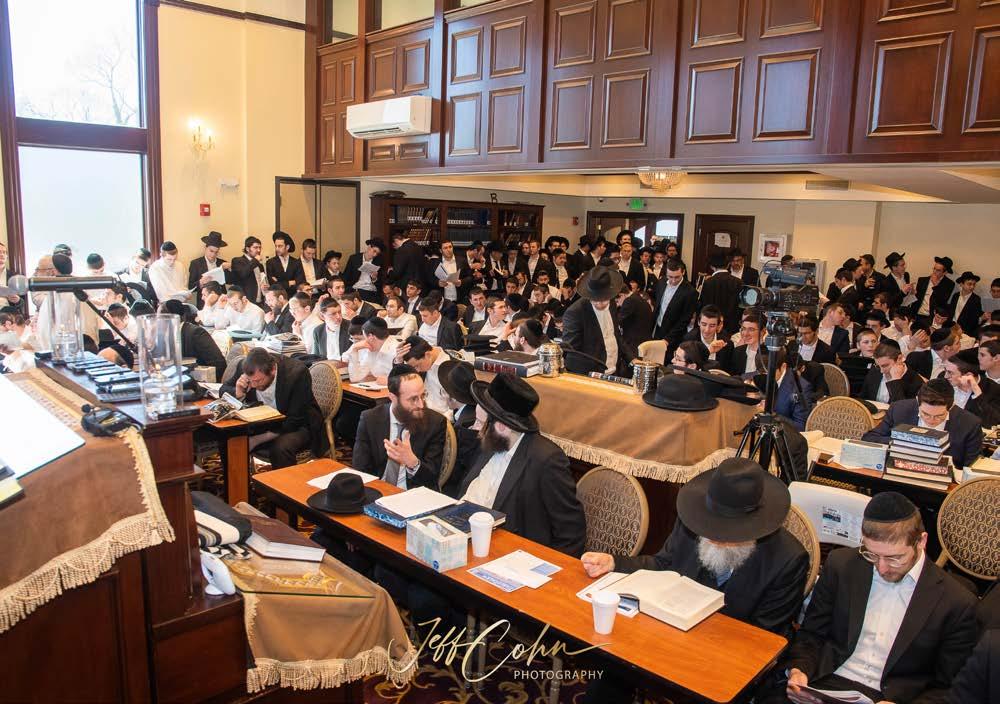
Over Pesach, Mercaz Torah U’Tefilah become known as the “Mercaz Yeshivas Bein HaZmanim” for the Baltimore community, as hundreds and hundreds of Bachurim and Yungerleit back for Bein HaZmanim took advantage of the robust Bein HaZmanim programming. This includes a daily catered breakfast, refreshments and freshly brewed coffee throughout the day, hot fleishigs for night Seder, and of course the many Shiurim given by Rabbeim (from all of the local Yeshivos) before, during, and after Yom Tov.
New for this Bein HaZmanim, and truly historic for the Baltimore community, is the new Minyanim schedule which included Shacharis every 15 minutes throughout the morning. The new Minyanim take place in the house 2 doors down from the main Shul building. This contributes to the lively atmosphere, as there is a constant flow of people in and out and between the Mercaz Torah U’Tefilah properties. In fact these minyanim became so popular that Mercaz will continue this minyan schedule beyond Bein Hazmanim (see the BJH minyan schedule for more info)!
The highlight of the Pesach Bein HaZmanim every year is the pre-Pesach community Shiur given by one of the Gedolei Roshei Yeshivos who come in specially to be mechazeik all of those who dedicated their Bein Hazmanim to Limud HaTorah! This standing-room only Shiur is a true Ma’amad of Kavod HaTorah, and sets the tone for the Shteiging that goes on throughout Pesach.
This year we were Zocheh to hear a Shiur from Moreinu HaGaon Harav Malkiel Kotler Shlit”a, Rosh Yeshivas Beis Medrash Govoha. The Rosh Yeshiva spoke on the Sugya of “אלש לכ ידי אצי אל חספב ולא םירבד השלש רמא ותבוח” and ended with Divrei Chizuk focusing on the Passuk “ךיקלא ’ה יכנא


והאלמאו ךיפ בחרה םירצמ ץראמ ךלעמה”. Everyone came out inspired, motivated to strive for greatness in Torah!
The learning was a real Chizzuk to the entire community and is something that Baltimore is so proud of. Wishing all the Bnei Torah much Hatzlacha in their upcoming zman.







Agenerous $5 million gift from Mandy and Dennis Weinman will help fund a new threestory, 125,000 square foot, state-of-the-art cancer building on the campus of Sinai Hospital.
New York, N.Y. – The Orthodox Union (OU), the nation’s largest Orthodox Jewish umbrella organization, is pleased to welcome Yitzie Pretter of Baltimore, Md. to the OU’s Board of Directors. Pretter is among 14 new OU Board Members from across the U.S. and Canada elected to a two-year term.
Professionally, Pretter is the founding principal of commercial real estate firm Mosaic Realty Partners. He holds an MBA in Finance from Johns Hopkins Carey Business School and a bachelor’s in Talmudic Law from Ner Israel Rabbinical College. His communal involvement includes having Board affiliations with AssociatedJewish Federation of Baltimore; Bnai Jacob Shaarei Zion; Bais Yaakov of Baltimore; AIPAC NLN; JTAP Baltimore; Shidduch Center of Baltimore; Toras Simcha - Baltimore; Nation Young Leadership Cabinet - JFNA; Jewish Educational Services - Baltimore; and Laniado Hospital, where he is mid-Atlantic Co-Chair.
The OU Board is responsible for determining the OU’s mission and vision; ensuring strong fiduciary oversight and financial management; fundraising and resource development; and monitoring and assessing the OU’s programs and services. Board members also serve as advisors to the OU’s various departments.
In addition to Pretter, the new board members are:
Esti Kaminetzky, National Vice President, Teaneck, N.J.
Jeff Cohen, Director-at-Large, Fair Lawn, N.J.
Zev Blumenfrucht, Director-atLarge, New York, N.Y.
Daniel Lowy, Director-atLarge, New York, N.Y.
Joel Mael, Director-at-Large, Lawrence, N.Y.
Yechiel Eisenstadt, Director-at-Large, Flatbush, N.Y.
Stacey Goldman, Director-at-Large, Bala Cynwyd, Penn.
Yosi Heber, Director-at-Large, Detroit, Mich.
Chaya Tova Hartman, National Vice President, Chicago, Ill.
Ben Zlotnick, Director-at-Large, Toronto, Canada
Eitan Milgram, Director-at-Large, Boston, Mass.
Moshe Sassover, Director-at-Large, Los Angeles, Calif.
Yakov Polatsek, Director-at-Large, Houston, Texas
OU President Mitchel Aeder said:
“The OU extends its heartfelt congratulations to Yitzie Pretter and all of our new Board Members on joining this important journey with the OU. These individuals, who reflect the breadth of our community, were chosen for their dedication to communal service, and I look forward to working together to help the OU achieve our many goals.”
OU Executive Vice President Rabbi Moshe Hauer
said:
“We welcome our incoming Board Members for their commitment to serving am Yisrael and for their contributions to support the OU’s mission – enhancing the religious experience of the Jewish community. We also thank the incumbent Board members who are continuing their service.”
OU Executive Vice President Rabbi Dr. Josh Joseph said:
“The OU relies on our Board for crucial strategic planning, program oversight and the many talents they bring to this work. We are proud of our strong layprofessional partnership that works tirelessly to make everything run smoothly and efficiently.”
Contact: OrthodoxUnionPR@ou.org
About the Orthodox Union
Founded in 1898, the Orthodox Union (OU), or Union of Orthodox Jewish Congregations of America, serves as the voice of American Orthodox Jewry, with over 400 congregations in its synagogue network. As the umbrella organization for American Orthodox Jewry, the OU is at the forefront of advocacy work on both state and federal levels, outreach to Jewish teens and young professionals through NCSY, Israel Free Spirit Birthright, Yachad and OU Press, among many other divisions and programs.

 By: Councilman Yitzy Schleifer
By: Councilman Yitzy Schleifer
Nothing better than watching a two-yearlong project that we put a ton of work into come to fruition! I grew up in the Fallstaff neighborhood of District 5 and spent many days playing on the playground at Fallstaff Elementary Middle School - MD
Over the years, I have also taken my daughters there to play and noticed it was sadly deteriorating and becoming a hazard with countless nails sticking out and missing wooden planks. With all the fond memories I have of playing on that playground and now watching current students on the playground daily, I knew I had to act and get a new one for this generation of kids to play on.
I hopped on the project and imme-
diately got to work as a member of the budget committee and negotiated until we made it happen.
I want to thank the consultants (my daughters!) who viewed the different options and helped select the equipment that is now there. The new playground is an asset to the entire community, and by adding horses to the design, we were able to tie in Pimlico Race Course, a vital staple of the 5th District.
I would also like to thank Jenny Morgan from Rec & Parks for all her hard work on the project, Budget Chairman Councilman Eric T. Costello & Baltimore City Council President Nick J. Mosby for their support of this project, and Mayor Brandon Scott for working with our office to include this in his budget to make this dream a reality. I hope that children throughout the district will come to play on this fantastic new playground!






Ahighlight of the Kesser Torah calendar each year is the Retzufos Seder prior to the Pesach Bein ha’Zmanim. This four-hour seder allows bochurim to end their Winter Zman on a high and, in turn, catapults them into their Yom Tov. As in the past, this annual event not only involves Kesser Torah’s Mesivta bochurim but also welcomes back its many alumni.

In a testament to their love and appreciation for both their Mesivta and their Rebbeim, alumni, who learn in Eretz Yisroel, Lakewood, Monsey, and other locations, descend upon Kesser Torah in droves to soak up the warmth of the Bais Medrash and receive ongoing inspiration from their Rebbeim.

This Retzufos Seder was special in that it was the first to take place in the yeshiva’s new Bais Medrash. With a Kol Torah filling the entire Bais Medrash, each bochur was able to fully immerse himself in his learning.



During the seder, bochurim heard words of chizuk from the Rosh Me-


Join
Sunday, April 30 at 8:00 – 9:00 p.m.
Mintzes Theatre | Beth Tfiloh, 3300 Old Court Road Free
Dr. Pelcovitz has published and lectured extensively on a variety of topics related to education, parenting and child mental health. Areas of research and clinical specialty include family violence, the impact of domestic violence, stress management, transmitting values to children and adolescents and coping with trauma and loss.
Questions? Please contact Faye Friedman at ffriedman@jesbaltimore.org or 410-843-7589.
Scan to register, or visit bit.ly/

Registration in advance is required.
This program is named in loving memory of Rebbetzin Dr. Aviva Weisbord, z"l. Known simply as Aviva to her many friends and admirers, she was a beloved and highly respected leader in the Baltimore Jewish community and founding director of SHEMESH, offering support services to students, teachers and families. Serving as a family therapist, Aviva’s credo was always, “Family First” - a fitting name for the lecture series which honors her memory.

In
Dr. Aviva Weisbord, z"l
Her legacy is that of well-laid roots Deep reserves of faith Spring’s nurturing sunshine and Ample shade for our children.





Tell us about yourself:
I grew up in Brooklyn and my husband is from Baltimore. I moved here when we got married. For most of my married life I was a stay-athome mother, but a few months ago I took on a role as the program coordinator of a new organization in town called AIM, which stands for Association of Infants and Mothers- drawing from the word םא (mother).
What exactly is the AIM organization:


AIM was established to help mothers and their families after the birth of a new baby, by providing meals, cleaning help, helping hands and other services. AIM also pampers the new mother by having a special lunch and baby gift personally delivered by an AIM representative.
That sounds amazing. Why did you decide to get involved with AIM:
The first time I heard about AIM
positive, as you can imagine. I get so many comments about mothers feeling that they can get back to themselves so much faster after birth because they can focus on themselves and their family rather than having to worry about meals, cleaning, homework and bedtime.
Beyond the actual benefits of the services provided, I hear from mothers about how just the mere fact that they are thought of makes such a difference. To quote one mother: “I really needed a pick me up that week and it just meant the world that someone outside my home was thinking about me”.
Husbands too, are so appreciative that their wives can relax and recuperate. At the same time, it lightens the load that may fall on the husband during this time, allowing him to focus on his regular role within the family.
The kids within the family are also major beneficiaries, as this program aids in maintaining a semblance of stability during what can be an ex-
increasing around the community, we are experiencing exponential growth. We are only a few months into our 2nd year in operation and have already helped close to 250 families. This translates into around 3000 hours of cleaning help provided so far, and close to 4000 warm and nutritious meals delivered!
I imagine with so many families being serviced, you’re not handling all of this yourself. How do you get meals or any other services to the families?
There are many moving parts to the AIM organization, but a lot is done by a growing network of selfless volunteers who are dedicated to the AIM mission. Volunteer opportunities currently include organizing the weekday or Shabbos meal packages, delivering meals, and transportation for the high school girls who provide the helping hands. I will mention that we need many more volunteers as the reach of AIM grows, so please get involved if you can by signing up at www.aimbaltimore.com/volunteers.
How is AIM funded:
AIM relies on the support of generous community members. There have been a few individuals who generously provided funding to get AIM started, but of course as our reach grows the expenses to run the organization grow along with it. To that end, we are preparing for the inaugural annual “AIM Event” coming up right after Shavuos, which will include a gala Chinese Auction to help fund the organization. So save the date – June 6th – for what promises to be an exciting and entertaining evening! Stay tuned for more details.
How can someone register for AIM services or otherwise get involved:

If you’re a mother after birth and would like to register for AIM services, please visit our site at https:// www.aimbaltimore.com/new-mothers. It’s important to note that services are offered whether a healthy baby was born, or C”V there’s been a stillborn.

In terms of getting involved, there are many ways to help and get involved with AIM. If you want to learn more about the organization or get involved in some way, please head over to www.aimbaltimore.com
Helping mothers after birth is helping families and laying a foundation for raising happy and healthy generations of Klal Yisroel!


dle Eastern power. On Monday, it was reported that the delegation did not receive the proper visas and that their trip was postponed for now.
For years, Saudi Arabia has had a cold relationship with the terror group Hamas, even arresting many people with connection to the group. But now, things are changing.
This week, a senior delegation representing the jihadist group was set to visit Saudi Arabia on Sunday, according to multiple Arabic media reports. The development in warming relations is concerning for Israel, as the Jewish state hopes to forge ties with the Mid-
Just recently, Saudi Arabia connected with its foe, Iran. Now, Riyadh is set to host a high-level delegation including Hamas politburo chief Ismail Haniyeh, his deputy Saleh al-Arouri, and the head of the group abroad, Khaled Mashaal.

Once in the kingdom, the delegation was supposed to pay a pilgrimage to Islam’s holiest site in Mecca and try to mend Hamas’s relationship with Riyadh, which has been frosty since 2007, when the terror group overthrew the Palestinian Authority and took over Gaza in a bloody coup. Saudi leaders had blamed Hamas for the failure of attempts at reconciliation between it and the PA’s Fatah party.
In 2019, Saudi authorities arrested dozens of Hamas-linked operatives, saying they were threatening the kingdom’s rule.
But lately, Hamas leaders have been reaching out to the leaders of the kingdom, and Saudi Arabia has seemed to accept the overtures, releasing many of those detainees.
Rabbi Yaacov Haber is a highly respected leader in Jewish education, presently serving as the Rav of Kehillas Shivtei Yeshurun in Ramat Beit Shemesh, Israel. He is the co-founder of Mosaica Press and has also established numerous educational organizations. His energy, scholarship, and creativity continue to inspire all those who meet him to grow and reach higher to become their best selves.

The new warming ties are a blow to Israel. Prime Minister Benjamin Netanyahu prioritized including the kingdom in the iconic 2020 Abraham Accords upon his return to office in December, but Riyadh and other Muslim nations have become reluctant to openly advance a deal due to spiking Israeli-Palestinian tensions.
A plan brokered by Washington to schedule direct flights from Tel Aviv to Mecca, allowing Israel’s Muslim citizens to more easily take part in the sacred Hajj pilgrimage, is unlikely to be finalized, according to the Wall Street Journal.
Israel had seen the kingdom as an ally against shared-enemy Iran. Now, with a relationship officially in the works between Riyadh and Tehran, Israel cannot rely on that connection.
At the start of 2022, there were a total of 15.3 million Jews in the world, 7 million of whom, roughly 46% of all
Gain a deeper understanding of each of the Tannaim and the period in which they lived with this new encyclopedic commentary that brings their timeless messages to life.

This book has inspired thousands of people to transform their Sefiras HaOmer by understanding the seven mystical revelations of G-d’s character, known as the sefiros. It offers relatable techniques for achieving spiritual growth, taking readers on a seven-week journey to spiritual refinement enhanced relationship with G-d and mankind.


Jews worldwide, resided in Israel, Israel’s Central Bureau of Statistics revealed on Sunday.
In 1939, on the eve of World War II, Jews numbered 16.6 million, and 449,000 (3%) resided in the Land of Israel. Just under 10 years later, in 1948, the world’s Jewish population had diminished to 11.5 million; of them, 650,000 (6%) lived in Israel.
Among Diaspora Jews, about 6 million live in the United States, 442,000 in France, 392,000 in Canada, 292,000 in Britain, 173,000 in Argentina, 145,000 in Russia, 118,000 in Germany, and another 118,000 in Australia, according to the report.
Ahead of Holocaust Remembrance Day, which began on the evening of April 17, the CBS also revealed that 147,199 Holocaust survivors or victims of antisemitic actions during the Holocaust are currently living in Israel.
Of those survivors, 61% are women and 39% are men.
A small number, 4.5%, immigrated to Israel before the establishment of the state, between 1933 to 1947; 31.7% immigrated during the large aliyah wave following the state’s establish-

ment (1948 to 1951); 29.7% immigrated between 1952 and 1989; and 34.1% came since the 1990s, during the wave of aliyah from the former Soviet Union.
In a 2021 survey, 87% of Israel’s survivors said they were either “satisfied” or “very satisfied” with their lives, similar to the 88% of Jews and others above the age of 75. However, 17.3% of Holocaust survivors said they felt lonely often, compared to 12.6% of Jews and others 75 and older. (JNS)


Reza Pahlavi, the son of the Shah of Iran who had been overthrown by the Islamic Revolution, arrived in Israel on Monday.
“We are very happy to be here and are dedicated to working toward the peaceful and prosperous future that the people of our region deserve,” Reza Pahlavi wrote on Twitter, after arriving in Israel with his wife.
“From the children of Cyrus, to the children of Israel, we will build this future together, in friendship.”

He took part in an official ceremony for Yom HaShoah at Yad Vashem.
“As author Elie Wiesel said, without memory there is no hope,” Pahlavi
tweeted.
Before coming to the Holy Land, Pahlavi said his visit will focus on Israeli water technology and renewing ties.
“The Iranian and Jewish people have ancient bonds dating back to Cyrus the Great and Queen Esther,” Pahlavi said in a statement on Sunday. “As the children of Cyrus, the Iranian people aspire to have a government that honors his legacy of upholding human rights and respecting religious and cultural diversity, including through the restoration of peaceful and friendly relations with Israel and Iran’s other neighbors in the region,” he added.
Israel and Iran maintained close ties — particularly on energy and security — during the reign of Shah Mohammad Reza Pahlavi, who was overthrown in a popular 1979 uprising led by Islamist clerics. Since then, Israel and Iran have become bitter enemies, with Iranian leaders regularly calling
















Yossi. He was on my mind twenty-four/seven. Whatever I did, wherever I went, I could not take his sweet smile off the mental screen staring me in the face.
Yossi. He was a good kid, but he had his set of challenges. He struggled through cheder, trying to keep up with the rest of his class. When the time came for him to start yeshivah, we did our research and found the perfect place for him. We were overjoyed when he was accepted.
Then, just a couple of months later, we were delivered a slap. Yossi was kicked out, sent home from the environment we had so carefully selected for him. The administration of the yeshivah felt that he was simply not a fit, being that he was hardly able to keep up scholastically.
Day after long day, Yossi kept me company at home as we tried unsuccessfully to get him into a different yeshivah. But no yeshivah was willing to accept him.
Dealing with my pain as his mother was one thing. Dealing with Yossi’s pain was another. It was excruciating to watch as he grew more brokenhearted by the day. He so badly wanted the chance to be a yeshivah bachur like all his friends.
I cried over my siddur, begging Hashem for a yeshuah
I read some stories about Tehillim Kollel and grew increasingly inspired. This was it! I knew what I had to do. I called Tehillim Kollel and gave over my son’s name. I knew the zechus of serious yungerleit reciting all of Tehillim on his behalf would not go unanswered.



And the yeshuah indeed came as if from left field. One day, his old yeshivah called. They were ready to take him back. It was an ideal setup and my husband and I were delighted to watch Yossi’s face light up as he resumed life in yeshivah.

Thank you, Tehillim Kollel, for being such wonderful shlichim!

for the destruction of the Jewish State and backing terror groups committed to this goal.
Pahlavi left Iran at age 17 for military flight school in the U.S., just before his cancer-stricken father Mohammad Reza Pahlavi abandoned the throne for exile.
Pahlavi, who still resides in the U.S., has called for a peaceful revolution in Iran that would replace clerical rule with a parliamentary monarchy, enshrine human rights, and modernize its state-run economy.
daughters in a terror attack on Pesach.
Lucy Dee, 48, and her daughters Maia Dee, 20, and Rina Dee, 15, were killed after Palestinian terrorists opened fire at the car they were in as they drove through the northern Jordan Valley on April 7. The daughters were declared dead at the scene, while Lucy was rushed to a hospital in critical condition but died three days later.

As of now, the murderers have not yet been arrested.
On Sunday, Rabbi Dee told the media that he bears no hatred towards those who slaughtered his loved ones.
“I have no hatred towards the… terrorists,” he told Channel 12. “I obviously would like them to be captured and to be treated with full justice that they deserve, but mostly to stop them from doing anything like this ever again.”
He added, “Nothing is going to bring back our beloved Lucy, Maia, and Rena.”
Rabbi Leo Dee has suffered unfathomable pain as he lost his wife and two
The family had been on the road from Efrat to Tiverya for vacation when the attack occurred. They had taken two cars. Leo had been in a sep-
Discover how those who suffer have transformed their pain into something powerful and purposeful, spreading light into the darkness.
Explore the universal relevance of the Jewish value of tzniut through a diverse anthology of essays and a comprehensive explanation of halachot—and gain an empowering and positive approach to this beautiful yet often misunderstood mitzvah.
Discover a fascinating and practical overview of complex medical and mental health issues from a Torah perspective. An indispensable resource for patients, caregivers, and medical professionals.
Hashem: An Introduction to the Creator


Rabbi Avi Okin, MSW
Delve into fundamental concepts in Judaism and learn how to cultivate a sense of love and awe for the Divine, no matter your level of knowledge or experience.
The Wisdom of Avos
Rabbi Yisroel Miller
Enter the world of Pirkei Avos with a novel approach to examining the Mishnayos, and discover a treasure house of wisdom and insight.

The First Ten Letters
Rabbi Raffi Bilek
The letters, their meanings, their shapes, and their numerical values; the very alphabet of the Divine language can teach us some profound truths about Judaism, life, and the universe.
BOOKS YOU MAY HAVE MISSED

“A book for which people in pain have long been searching”
—Rabbi Dr, Tzvi Hersch Weinreb

arate car with his son and two other daughters.
“My focus is very much on the future, for us and for [the people] of Israel,” he said.
“I’ve had some Palestinian friends of mine from neighboring villages who have left messages in tears, because I’ve known them for many years, they’ve known Lucy, they’ve known the girls,” Leo said, explaining how he developed friendships with builders and gardeners whom he employed to work on his home.
“We’ve spent a lot of time together. Because I never got any guards, I don’t have a gun, and I would spend the day working from home while they came, and we would end up chatting, having coffee, talking about their kids, talking about our kids. We trusted them, I trusted them completely with the family. I still do, more so than any other people I know.
“When I spoke to one of my friends recently, he said ‘Look, we love you,’” Dee said, adding that he believed a majority of Palestinians were “decent

He related that when he met Prime Minister Netanyahu, he spoke about uniting the Jewish nation.
“I really just stressed to him the value of bringing the Jewish people together, which is really through love, and embracing people, and looking at the good,” Dee said. “I don’t know why we have to focus on things that push and pull us apart, because we can focus on the things that different segments of the populations are achieving.”
The Dee family had immigrated to Israel nine years ago from the UK. They have dual citizenship.
Shas Knesset member Moshe Arbel will replace party leader Aryeh Deri as health and interior minister.
The move comes after Deri was removed from the posts in January by Israel’s Supreme Court.
Arbel had filled the positions temporarily, but as there is a three-month time limit on temporary assignments, the government was compelled to make Arbel’s appointments permanent, according to Kan News
However, the Shas Party said on Monday that it would “act as soon as possible to pass the law required to correct the injustice, and to appoint Rabbi Aryeh Deri as minister,” referring to a bill that passed its first reading in the Knesset plenum on March 20.
Amendment 16 to Basic Law: The Government prohibits all courts, including the Supreme Court, from ruling on the legality of government ministerial appointments. It was passed by a vote of 63 to 55.
The proposed legislation would allow Israeli Prime Minister Benjamin
vious roles, after having been forced to fire him on January 22 after the court ruled that Deri’s appointment was “unreasonable in the extreme” due to a prior tax fraud conviction.
The Supreme Court ruling came despite a Knesset amendment passed in December specifying that a ban on persons serving as ministers for seven years if convicted of a criminal offense applies only to those serving active jail sentences. Deri was handed a suspended jail sentence as part of a plea bargain last February.
Deri was also dismissed from his role as vice prime minister following the ruling.
“The Supreme Court threw into the trash the votes of 400,000 voters,” the Shas Party said in a statement at the time of the court’s decision. (JNS)
Recently, Moody’s Investors Ser-
























On Monday, the service said that the key trigger for the decrease was concern that the planned changes to the country’s legal system would threaten the independence of the judiciary.
Speaking at a webinar after Friday’s outlook downgrade, Moody’s Senior Vice President Kathrin Muehlbronner explained that the credit agency assesses a country’s strength of executive and legislative institutions, the strength of its civil society and the judiciary, and how effective they are.
“The only driver for our rating action last Friday were the events around the government’s plans for judicial changes [which] have shown us that, in Israel, you can have a government that is willing to take pretty significant risks with economic and social stability,” said Muehlbronner. “With Israel, our main concern is the executive pushing through important changes to the institutional setup of the country at such a speed, and without any dialogue really, for us is not a sign of strong institutions.”
She added, “Having a strong and independent judiciary is important everywhere, but even more so in a system like Israel, where there are really only two branches of government, the executive and the judiciary,” she emphasized. “Other checks and balances that exist in other countries are relatively weak in Israel.”
Muehlbronner added that she was “impressed” with the protests rocking the country.
“Their protests have brought the government to change its position and


Still, she said that the protests have exposed “deep divisions” in Israeli society and cautioned that the rating agency expects social and political risks to remain elevated for quite some time.
“We think those [divisions] run deeper than the judicial changes,” she warned. “They have a lot to do with the demographic composition in Israel and the highly unequal income distribution.”
On Sunday, Finance Minister Bezalel Smotrich said that the Moody’s downgrade was “no big drama,” reiterating his claim that the planned judicial changes will be good for the economy and any damage would be a result of the “campaigns of lies” against the overhaul.
“I don’t think economists are great experts in constitutional, judicial law; they don’t hold a doctorate on governmental structure in Israel,” Smotrich said. “The responsibility of Israel’s economy lies on my shoulders, not on Moody’s shoulders.”
Moody’s reaffirmed Israel’s A1
nomic growth and improving fiscal strength.”
In 2022, Israel posted the first budget surplus in 35 years of 0.6% of GDP as state revenues rose 4.8% to NIS 468.5 billion and exceeded total expenditure of NIS 458.8 billion. For this year, the Finance Ministry targets budget deficits of 0.9% in 2023 and 0.8% of GDP in 2024.


A Hungarian Jew, whose whole family was killed in the Holocaust, was sent to various concentration camps. At Mauthausen in Austria, an SS officer would wake him and other prisoners up every day.
“‘You dream of Jerusalem?’ the officer would yell at them. ‘You will never get to see Jerusalem. You will only see Jerusalem only through chimneys of the furnaces,’” said Israeli Prime Minister Benjamin Netanyahu on Yom

But the Jewish man never gave up, survived the Holocaust, and moved to Israel. He didn’t live in Jerusalem, but he never forgot that city. He started a large family, and as an older man, began working at the Western Wall (Kotel), as Netanyahu told it, speaking at the state opening ceremony for Holocaust Martyrs’ and Heroes’ Remembrance Day 2023 at Yad Vashem on April 17.
“That was the greatest victory over the Nazis,” Netanyahu said. Working every day at the Kotel, the man, who passed away at 95 a year-and-a-half ago, felt there was a great turn from Holocaust to rebirth and resurrection.
“A true symbol of our triumph over our enemies,” said Netanyahu.












The scars of the pain of the Holocaust remain forever, he continued. But he also said to the survivors: “You chose life. You believed in good. You helped others.” Many started large families, he noted.

“The height of this victory is the independence of our 75-year-old country. Israel is a vibrant, free, democratic
country, with so many achievements,” he said.




But past victories don’t guarantee future ones, and there is a “relentless battle against those who seek to kill us,” Netanyahu cautioned. He said Israel must not allow a nuclear Iran and must fight its terrorist proxies all around.
“Our enemies,” he stated, “will find us standing shoulder to shoulder together.” (JNS)










When you own a car that’s fancier than any other in the neighborhood, you’ve got to have an over-the-top license plate to match.
Recently, a license plate sold for a jaw-dropping 55 million dirhams ($15 million) at a charity auction in Dubai, fetching what organizers Emirates

Auction say is a world record price.
What does it say on this piece of art? Two things: P7. That’s it.












P7 is now the most expensive plate around. It smashed the previous record that Saeed Abdul Ghaffar Khouri snagged when he bought a license plate 52.2 million dirhams ($14.2 million) in February 2008 at an auction organized by the same company.
those during the month of Ramadan.
P7 was not the only plate to be sold at the auction. Another one sold for around $800,000, while $38,000 was the price that went for another.
Overall, the auction raised more than $19 million for charity.

It was a smashing success.
The charity was organized to raise funds for One Billion Meals, a program run by the ruler of Dubai and prime minister of the UAE to help
Paper airplanes are not just about paper and sharp creases. There’s a real science to crafting the best aircraft out of paper.
Recently, the world record for the farthest flight by paper airplane was broken by three aerospace engi -



neers with a paper aircraft that flew a grand total of 289 feet, 9 inches, nearly the length of an American football field.
They beat the previous record of 252 feet, 7 inches (77 meters) achieved on April 2022 by a trio in South Korea. Prior to that, the record had not been broken in over a decade.
“It really put things on the map and it’s a really proud moment for family and friends,” said Dillon Ruble, a systems engineer at Boeing and now paper airplane record holder. ”It’s a good tie in to aerospace and thinking along the lines of designing and creating prototypes.”
Ruble worked alongside Garrett Jensen, a strength engineer also with Boeing, and aerospace engineer Nathaniel Erickson. The trio are recent graduates who studied aerospace engineering and mechanical engineering at Missouri University of Science and Technology.
This was real work. The feat required months of effort, as the team put in nearly 500 hours of studying origami and aerodynamics to create
and test multiple prototypes. The engineers put their final design to the test on December 2, 2022, in Crown Point, Indiana, where the record was achieved on Ruble’s third throw.
“We hope this record stands for quite a while — 290 feet (88 meters) is unreal,” Jensen said in the release. “That’s 14 to 15 feet (4.2 to 4.6 meters) over the farthest throw we ever did. It took a lot of planning and a lot of skill to beat the previous record.”
In order to come up with the best airplane, the three looked at hypersonic aircraft for inspiration.
They also needed to practice to make sure they have the best technique in throwing the paper flying object.
For those looking for some tips, “We found the optimal angle is about 40 degrees off the ground. Once you’re aiming that high, you throw as hard as possible. That gives us our best distance,” Jensen said. “It took simulations to figure that out. I didn’t think we could get useful data from a simulation on a paper airplane. Turns out, we could.”
Fasten your seatbelts.
Darryl Pitt, head of the meteorite division at the Maine Mineral & Gem Museum, wants to study any fragments of the meteorite, which, depending on the type, could contain valuable information about the origins of the solar system.
But not everyone gets the prize. The $25,000 reward is for the first meteorite piece found that weighs 2.2 pounds or more. Still, the museum would be willing to pay for any specimen “irrespective of its size.”
Looking for some cool cash that is truly out of this world? A museum in Maine is offering $25,000 for the remains of a space rock that streaked across the sky last week before landing near the border between the United States and Canada.
The fireball, which was visible in broad daylight and created a sonic boom, was detected by radar, allowing NASA’s Astromaterials Research and Exploration Science (ARES)
Lab to calculate the “strewn field” — where fragments of the meteor might be found — near Calais, Maine.
“Finding meteorites in woods of Maine. It’s not the simplest of the environments,” Pitt noted.
Finding a piece of space is not easy. Only eight to ten meteorites are recovered each year out of hundreds of fireballs seen falling to Earth.

According to Pitt, meteorites may be easy to spot. The outside would likely be blackened — after being toasted by the heat as it plummeted through Earth’s atmosphere — while the inside would likely be a different color. It may also contain iron and therefore be attracted to a magnet.
Gotta shoot for the stars.


The root problem of the ערצמ — the Metzora is evident in his very name: ַע רָצ [ — a stingy eye.


One who possesses an ’evil eye’, one laced with jealousy and contempt for all who disturb his narrow view of the universe and his machinations, will infiltrate negativity to every interaction, inciting divisiveness, stress and dissatisfaction.
Most often it is the caustic comments and insensitive words that become the agents of the evil eye that wreak havoc among society, and breed
the numerous sins associated with the Metzora, as enumerated throughout the Talmud and Midrash.







Despite the wagonload of sins born by the Metzora, upon the conclusion of the suffering he must endure because of his attitude, the Talmud states he achieves full atonement.
Although upon healing he must still bring an םשא — guilt-offering, and a תאטח — sin-offering, which would intimate his need for further expiation, the Talmud teaches this is not the case, and he is no longer in need of atonement.
Despite his requirement to bring a guilt-offering and sin-offering, it is merely for the purpose of ’purification’ from his former spiritual ailment. This is indicated in the anomaly of the Metzora’s offerings from amongst all other guilt-offerings and sin-offerings, who are not to offer ’joyous’ and ’refreshing’ nesachim — libation of wine and oil, to accompany their offerings that are tainted from sin, but the Metzora must bring libation!
It has been suggested that since the Metzora is not bringing a sin or guilt offering in the normative sense,

then it would also not require יודו — a declaration of his having sinned, as is required by all other sin and guilt offerings. In its place he would instead express words of חבש — praise and gratitude, like what one who brings a peace-offering does.
It seems that what is taking place here is a transformation from a narrow-eye malcontent into a gracious and grateful servant of G-d who has deepened his awareness of a benevolent G-d Who runs His universe with kindness and purpose, with no room for selfishness and disappointment, only praise and thanks.
Yehuda Steinberg & Bracha Eisenberg (Both Baltimore)
Emanuel Shoob (Baltimore) & Chaya Sara Lavihayem (Lakewood)
Jaim Magendzo & Chaviva Storch (Baltimore)
Mordechai Silber (Baltimore) & Chaya Rochel Freundlich (Monsey)
Shalom Ehrlichster & Adina Monderer (Baltimore)
Mordechai Weiner & Esti Hexter (Both Baltimore)
Meir Yakov Sobolofsky (Bergenfield) & Gittie Neuberger (Baltimore)
Chaim Yaakov Friedman & Cirelle Verschleisser (Both Baltimore)
Shlomo Dovid Rifkind (Baltimore) & Chana Chaviva Scheinberg (Monsey)
Aharon Tzvi Horowitz (Baltimore) & Adina Mintz (Toronto)
Zevi Pinter (Lakewood) & Rikki Goldstein (Baltimore)
Zevi Traub (Baltimore) & Tammy Fisch (Jacksonville)
Josh Strimber & Lani Roskes (Both Baltimore)
Yechiel Shapiro (RBS) & Michal Spigelman (Baltimore)
Saul Sawilowsky (Baltimore) & Raphaella Tenembaum (Silver Spring)



The Midrash asserts that we initiate the purification process with the taking of two birds, one which we slaughter and one that we set free, expressing, “let the voiceful ones atone for the one who made noise”.
As the Rebbe, Reb Nachman, so exquisitely asserts, ‘let the sweet music of the universe, embodied in these ‘live birds’, enthuse the one whose vocal cords were smitten with egotistical coarseness.’ (ג רהמ
It is alleged that the תינונס — the swallow, is the bird that is utilized in this process.
The הריש — the song, this bird sings is the verse: So that sing to You my soul and not be silenced, Hashem, my G-d, forever will I thank You. (גי)
I was recently at a l’chaim, where the grandfather of the Chosson, Rabbi Shmuel Bloom — an old and dear family friend, a man twelve years my senior, who was one of the older ‘yeshiva boys’, who impacted us youngsters to strive to become enthusiastic ‘Bnai Torah’ like them, in the early days of the burgeoning yeshiva movement — was in attendance.


He is a father of eleven children and numerous grandchildren and great-grandchildren.
I asked him how many grandchildren he had and where the Chosson numbered on that totem pole. He answered on the spot.
I recalled to him an article I had read some time ago about a Yiddeshe
Bubbeh who had survived the Holocaust, who when asked how many living descendants she merited, refused to reveal the number out of concern of casting an ערה ןיע — ‘evil-eye’.
Allegedly, the great Gadol, Rav Yaakov Kaminetzky was present and with his inimitable warmth, respectfully took to differ with her fear, stating that one should rather express publicly with genuine and joyous gratitude to Hashem, for each gift of a child one has been blessed with.
The father of the Chosson piped in and asked, “But what about Ayin Hora?”
The wise and learned grandfather explained that the power of an evil eye to inflict damage is only when a taint of jealousy might be present among

those that hear it. That dangerous jealousy can unleash a prosecutorial sentiment, questioning the worthiness of the recipient of that gift, in Heaven. The power, however, he so rightly affirmed, of an absolute and sincere gratitude and true appreciation of Hashem’s constant benevolence, will overpower and quash the ability of anyone’s negativity to cause any ill effect whatsoever.
May we ’swallow’ our negative attitudes and ’sing’ a marvelous song of thanks to Hashem, every living moment, for the privilege to serve Him and to always be in His loving embrace.
You may reach the author at: Ravzt@ohelmoshebaltimore.com




Neitz Beit Yaakov [Sefaradi] M-F
Ohel Yakov S-F
6:00 AM Shomrei Emunah Congregation M-F
6:10 AM Agudath Israel of Baltimore M, Th
6:15 AM Kol Torah M, TH
Mercaz Torah U'Tefillah M-F
Shearith Israel Congregation M, TH
The Adas: Chofetz Chaim Adas Bnei Israel M, TH
6:20 AM Agudah of Greenspring M, TH Agudath Israel of Baltimore S, T, W, F
Arugas HaBosem (Rabbi Taub's) S-F
Bnai Jacob Shaarei Zion Congregation M-F
Kehilath B'nai Torah M, TH
Shomrei Emunah Congregation S, M, TH
6:25 AM The Adas: Chofetz Chaim Adas Bnei Israel T, W, F
6:30 AM Agudah of Greenspring T, W, F Chabad of Park Heights M-F
Darchei Tzedek M-F
Kehilath B'nai Torah T, W, F
Khal Bais Nosson M-F
Khal Ahavas Yisroel/ Tzemach Tzedek M-F
Kol Torah T, W, F
Ohr Yisroel M-F
Shearith Israel Congregation T, W, F
Shomrei Emunah Congregation T, W, F
6:35 AM Aish Kodesh (downstairs Minyan) M, TH
Ohel Moshe M, TH
6:40 AM Aish Kodesh (downstairs Minyan) T, W, F Bnai Jacob Shaarei Zion Congregation M, TH
6:45 AM B”H and Mesivta of Baltimore (Dirshu Minyan) S-F
Beth Abraham M, TH
Greenspring Sephardic Synagogue M-F
Mercaz Torah U'Tefillah S-F
Ner Tamid M-F
Ohel Moshe T, W, F
Suburban Orthodox Congregation Toras Chaim M-F
6:50 AM Agudath Israel of Baltimore M, TH
Ahavat Shalom [Sefaradi] M, TH
Bais Medrash of Ranchleigh M, TH
Bnai Jacob Shaarei Zion Congregation T, W, F
Community Kollel Tiferes Moshe Aryeh M, TH
Derech Chaim M-F
Kol Torah M-F
Ohel Moshe S
Ohr Hamizrach [Sefaradi] M, TH
Shomrei Emunah Congregation M, TH
The Shul at the Lubavitch Center M, TH
6:55 AM Beth Abraham T, W, F
Kol Torah M, TH
7:00 AM Aish Kodesh (upstairs Minyan) M-F
Agudath Israel of Baltimore S, T, W, F
Ahavat Shalom [Sefaradi] T, W, F
Arugas HaBosem (Rabbi Taub's) S
Bais Medrash of Ranchleigh T, W, F
Community Kollel Tiferes Moshe Aryeh T, W, F
Greenspring Sephardic Synagogue S
Khal Ahavas Yisroel/ Tzemach Tzedek S
Kol Torah T, W, F
Mercaz Torah U’Tefillah S-F
Moses Montefiore Anshe Emunah S-F
Ohr Hamizrach [Sefaradi] S, T, W, F
Shearith Israel Congregation S, M, TH
Shomrei Emunah Congregation T, W, F
Shomrei Mishmeres Hakodesh M-F
The Shul at the Lubavitch Center T, W, F
Tiferes Yisroel M-F
7:05 AM Machzikei Torah (Sternhill's) M, TH
7:15 AM Kedushas Yisrael S
Kol Torah S
Machzikei Torah (Sternhill's) S, T, W, F
Mercaz Torah U'Tefillah S-F
Ner Israel Rabbinical College S-F
7:15 AM Shearith Israel Congregation T, W, F
Shomrei Emunah Congregation S
Suburban Orthodox Congregation Toras Chaim S
The Adas: Chofetz Chaim Adas Bnei Israel S
Tzeirah Anash M-F
7:20 AM Agudath Israel of Baltimore M, TH
Beth Tfiloh Congregation M-F
Kol Torah M-F
Ohr Hamizrach [Sefaradi] M, TH
Shomrei Emunah Congregation M, TH
7:30 AM Agudah of Greenspring S
Agudath Israel of Baltimore S, T, W, F
Ahavat Shalom [Sefaradi] S
Bais Haknesses Ohr HaChaim S-F
Bais Hamedrash and Mesivta of Baltimore S-F
Bais Medrash of Ranchleigh S
Beit Yaakov [Sefaradi] S
Bnai Jacob Shaarei Zion Congregation S
Chabad of Park Heights S
Community Kollel Tiferes Moshe Aryeh S-F
Darchei Tzedek S
Kedushas Yisrael S-F
Khal Bais Nosson S
Ner Israel Rabbinical College (Mechina) S-F
Mercaz Torah U’Tefillah S-F
Ohr Hamizrach [Sefaradi] S, T, W, F
Shomrei Emunah Congregation T, W, F
7:45 AM Bnai Jacob Shaarei Zion Congregation M-F
Talmudical Academy S-F
Darchei Tzedek M-F
Mercaz Torah U'Tefillah S-F
Mesivta Kesser Torah S-F
Mesivta Shaarei Chaim S-F
7:50 AM Derech Chaim S
Ner Tamid S
Ohel Moshe M-F
8:00 AM Agudath Israel of Baltimore S-F
Beth Abraham S
Darchei Tzedek S
Khal Ahavas Yisroel/ Tzemach Tzedek S
Kehillas Meor HaTorah S
Mercaz Torah U’Tefillah S-F
Ohel Yakov S
Ohr Yisroel S
Pikesville Jewish Congregation S
Shearith Israel Congregation S
Shomrei Emunah Congregation S-F
The Shul at the Lubavitch Center S
Tiferes Yisroel S
Tzeirah Anash S
Yeshiva Tiferes Hatorah S-F
8:15 AM Kehilath B'nai Torah S
Kol Torah S
Mercaz Torah U'Tefillah S-F
8:20 AM Bais Haknesses Ohr HaChaim S-F
8:30 AM Agudath Israel of Baltimore S-F
Machzikei Torah (Sternhill's) S-F
Mercaz Torah U’Tefillah S-F
Ohel Moshe S
Ohr Hamizrach [Sefaradi] S
Shomrei Emunah Congregation S-F
Shomrei Mishmeres Hakodesh S
8:45 AM Mercaz Torah U'Tefillah S-F
9:00 AM Aish Kodesh S
Agudath Israel of Baltimore S-F
Bais Haknesses Ohr HaChaim S
Beth Tfiloh Congregation S
Bnai Jacob Shaarei Zion Congregation S
Mercaz Torah U’Tefillah S-F
Shomrei Emunah Congregation S-F
Suburban Orthodox Congregation Toras Chaim S-F
9:15 AM Mercaz Torah U'Tefillah S-F
9:30 AM Mercaz Torah U’Tefillah S-F
9:45 AM Mercaz Torah U'Tefillah S-F
10:00AM Mercaz Torah U’Tefillah S-F
Mincha Gedolah Mercaz Torah U’Tefillah
Khal Ahavas Yisroel/Tzemach Tzedek
1:45 PM Ohel Moshe
1:50 PM Bais Haknesses Ohr HaChaim
Neuberger, Quinn, Gielen, Rubin & Gibber
2:00 PM Agudath Israel of Baltimore
Big Al @ The Knish Shop Party Room
Kol Torah
Market Maven
Reischer Minyan 15 Walker Ave 2nd Floor
2:30 PM Bais Medrash of Ranchleigh
Ner Israel Rabbinical College
Tov Pizza Mincha Minyan
Community Kollel Tiferes Moshe Aryeh
Mesivta Shaarei Chaim (Etz Chaim Building)
Shearith Israel Congregation
3:00 PM Agudath Israel of Baltimore
Bais Haknesses Ohr HaChaim
Mercaz Torah U'Tefillah
3:05 PM Kedushas Yisrael
3:15 PM Hat Box
4:00 PM Agudath Israel of Baltimore
Mercaz Torah U'Tefillah
5:00 PM Agudath Israel of Baltimore
Mercaz Torah U'Tefillah
5:30 PM Agudath Israel of Baltimore
6:00 PM Kedushas Yisrael
Agudath Israel of Baltimore
Mercaz Torah U'Tefillah
7:00 PM Mercaz Torah U’Tefillah
14 Min Before ShkiAh Kol Torah
Aish Kodesh
Agudath Israel of Baltimore
Agudah of Greenspring
Bais Haknesses Ohr HaChaim
Beth Abraham
Bnai Jacob Shaarei Zion Congregation
Darchei Tzedek
Kehillas Meor HaTorah
Kehilath B’nai Torah
Khal Ahavas Yisroel/ Tzemach Tzedek
Machzikei Torah (Sternhill’s)
Mercaz Torah U’Tefillah
Ner Tamid
Ohel Moshe
Ohr Hamizrach [Sefaradi]
Ohr Yisroel
Pikesville Jewish Congregation
Shearith Israel Congregation
Shomrei Emunah Congregation
Shomrei Mishmeres
Suburban Orthodox Congregation Toras Chaim
The Adas: Chofetz Chaim Adas Bnei Israel
The Shul at the Lubavitch Center
Tiferes Yisroel
7:45 PM Talmudical Academy
8:00 PM Agudath Israel of Baltimore
Mercaz Torah U'Tefillah
8:10 PM Kol Torah
8:15 PM Khal Ahavas Yisroel/ Tzemach Tzedek
Shomrei Emunah Congregation
8:30 PM Agudath Israel of Baltimore
Ahavat Shalom [Sefaradi]
Mercaz Torah U’Tefillah
8:45 PM Darchei Tzedek
Ner Israel Rabbinical College (Mechina)
Ohr Yisroel
8:50 PM Mesivta Shaarei Chaim (Etz Chaim Building)
8:55 PM Community Kollel Tiferes Moshe Aryeh
9:00 PM Agudath Israel of Baltimore
Arugas Habosem
Mercaz Torah U'Tefillah
Shomrei Emunah Congregation
Suburban Orthodox Congregation Toras Chaim
9:20 PM Kol Torah
9:30 PM Agudah of Greenspring
Agudath Israel of Baltimore
Kedushas Yisrael
Mercaz Torah U'Tefillah
9:45 PM Bais Haknesses Ohr HaChaim
Kollel Erev Birchas Yitzchok (Luries)
Machzikei Torah (Sternhill's)
Ohr Hamizrach [Sefaradi]
Yeshiva Tiferes Hatorah
9:50 PM Aish Kodesh
Community Kollel Tiferes Moshe Aryeh
Ohel Moshe
10:00 PM Agudath Israel of Baltimore
Darchei Tzedek
Kehilath B'nai Torah
Khal Ahavas Yisroel/ Tzemach Tzedek
Mercaz Torah U'Tefillah
Shearith Israel Congregation
Shomrei Emunah Congregation
10:05 PM Kol Torah
10:10 PM Ner Israel Rabbinical College
10:15 PM Derech Chaim
Khal Bais Nosson
10:30 PM Agudath Israel of Baltimore
Mercaz Torah U'Tefillah
11:00 PM Agudath Israel of Baltimore
Mercaz Torah U'Tefillah
Agudah of Greenspring - 6107 Greenspring Ave
Agudath Israel of Baltimore - 6200 Park Heights Ave
Ahavat Shalom - 3009 Northbrook Rd
Aish Kodesh - 6207 Ivymount Rd
Arugas HaBosem - 3509 Cwlarks Ln
Bais Haknesses Ohr HaChaim - 3120 Clarks Ln
Bais Hamedrash and Mesivta of Baltimore - 6823 Old Pimlico Rd
Bais Medrash of Ranchleigh - 6618 Deancroft Rd
Beit Yaakov - 3615 Seven Mile Ln
Beth Abraham - 6208 Wallis Ave
Beth Tfiloh Congregation - 3300 Old Court Rd
Bnai Jacob Shaarei Zion Congregation - 6602 Park Heights Ave
Chabad of Park Heights - 3402 Clarks Ln
Community Kollel Tiferes Moshe Aryeh - 3800 Labyrinth Rd
Darchei Tzedek - 3201 Seven Mile Ln
Derech Chaim - 6229 Greenspring Ave (Weekday)
Greenspring Sephardic Synagogue 6611 Greenspring Ave.
Kedushas Yisrael - 6004 Park Heights Ave
Kehilath B’nai Torah - 6301 Green Meadow Pkwy
Kehillas Meor HaTorah - 6539 Pebble Brooke Rd
Khal Ahavas Yisroel/ Tzemach Tzedek - 6811 Park Heights Ave
Khal Bais Nosson - 2901 Taney Rd
Kol Torah - 2929 Fallstaff Rd
Machzikei Torah - 6216 Biltmore Ave
Mercaz Torah U’Tefillah - 6500 Baythorne Rd
Mesivta Kesser Torah - 8400 Park Heights Ave
Mesivta Shaarei Chaim - 3702 Fords Ln
Moses Montefiore Anshe Emunah - 7000 Rockland Hills Dr
Neuberger, Quinn, Gielen, Rubin & Gibber One South Street, 27th Floor
Ner Israel Rabbinical College - 400 Mt Wilson Ln
Ner Tamid - 6214 Pimlico Road
Ohel Moshe - 2808 Smith Ave
Ohel Yakov - 3200 Glen Ave
Ohr Hamizrach [Sefaradi] - 6813 Park Heights Ave
Ohr Yisroel - 2429 Lightfoot Dr
Pikesville Jewish Congregation - 7644 Carla Rd
Shearith Israel Congregation - 5835 Park Heights Ave
Shomrei Emunah Congregation - 6221 Greenspring Ave
Shomrei Mishmeres Hakodesh - 2821 W Strathmore Ave
Suburban Orthodox Congregation Toras Chaim - 7504 Seven Mile Ln
Talmudical Academy - 4445 Old Court Rd
The Adas: Chofetz Chaim Adas Bnei Israel - 5915 Park Heights Ave
The Shul at the Lubavitch Center - 6701 Old Pimlico Rd
Tiferes Yisroel - 6201 Park Heights Ave
Tzeirah Anash - 6706 Cross County Blvd
Yeshiva Tiferes Hatorah - 6819 Williamson Ave
or sponsorships, email ads@baltimorejewishhome.com

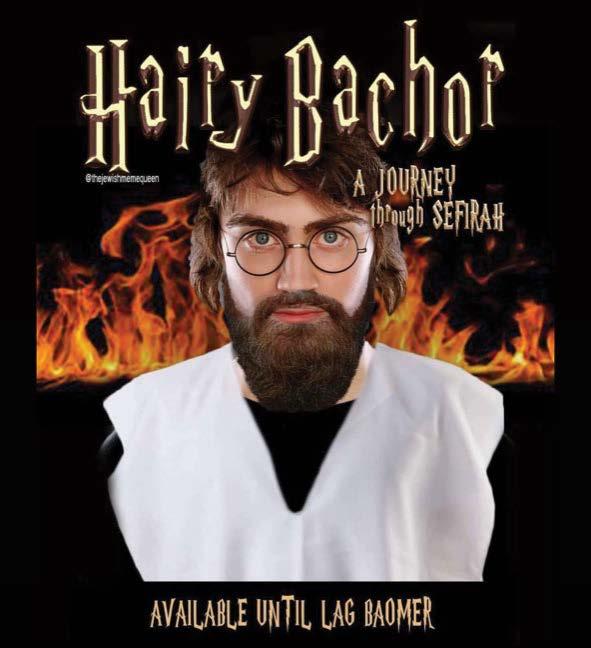


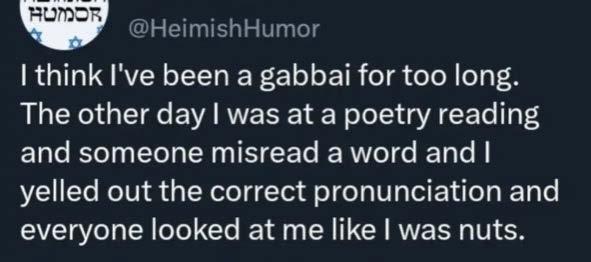

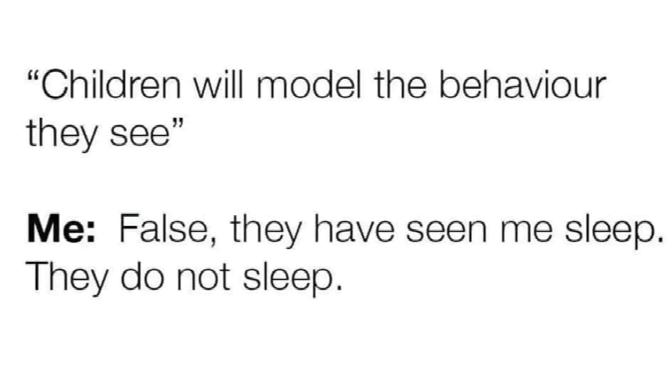


















Yehuda and Devorah have been married for fifty years and together they raised a beautiful family. Recently, Yehuda developed a medical condition that is chronic and requires constant care and attention. Devorah took it upon herself to be her husband’s primary caregiver and she told her children that this is the least she can do out of gratitude for the last fifty years of a wonderful marriage. Whenever any of her children or adult grandchildren offers to take a shift and relieve her for a few hours, she refuses. Her family
is concerned that the stress might be unhealthy, but are confused as to why Devorah is so adamant in refusing any help whatsoever.
One of the possible factors is caregiver guilt. Before we discuss guilt in regard to caregivers, we first must define guilt itself. In a nutshell, guilt is what we feel when our actions are inconsistent with our values. For example, if one damages someone else’s property this might lead to guilty feelings assuming that respecting other people’s property is part of one’s value system.

Guilt has some benefits as it prevents us from acting in ways that are against our morals and values. Knowing how badly we would feel if we would act in a certain way prevents us from doing it in the first place. Furthermore, you might want to conceptualize guilt in the same way as physical pain. Just like physical pain alerts us to an injury and prompts us to seek medical attention, similarly feelings of guilt alert us to a moral injury and spurs us to rectify our wrongdoings and repair any damage that we may have caused to others.
Sometimes, guilt is unearned and then it can be very destructive. Imagine someone who views themselves as a capable and loving parent. When something happens to their child that is out of their control, they might still hold themselves responsible since what happened is inconsistent with their idealized image of themselves as a good parent. This is as if to say, “If I was really a good parent, this never would have happened.” Since unearned guilt is not based on reality, it has no limits and can cause endless torment to a person’s psyche. All for something that he or she never did!
This brings us to caregiver guilt. When you are the primary caregiver of a loved one, you might feel that any shortcomings in your care reflects on your lack of true dedication. “If I leave his side, that means I do not really care about him.” “If I do not feel his pain all of the time, then I am a callous human being.” “If was a better spouse, I could have prevented this condition from happening in the first place.” And the list goes on. Overtime, this can lead to very elevated levels of stress, and can be a risk factor in the health of the caregiver. As such, you have the ultimate paradox. As a result of baseless feelings of guilt, you
overly dedicate yourself to caregiving which then affects your own health and now you no longer have the ability to be that idealized caregiver!
Here are some ideas that can help minimize unearned caregiver guilt.
Name the feeling. If you can say to yourself that you feel irrational guilt about leaving the bedside and that is why you refusing help, then the monster has been named and becomes easier to deal with.
Practice self-compassion. If you were talking to your friend, you would surely encourage them and tell them that you are a wonderful caregiver even if you lean on others for help. You can tell yourself the same message.
Examine your self-identity. Sometimes our feelings of guilt come from a grandiose idea of who we are. You are a good person even if you are not Superman. Don’t allow your idealized perspective of yourself get in the way of your own health.
As you have probably noticed, these concepts are often the kinds of discussions that take place in the context of psychotherapy. If the primary caregiver is open to engaging in psychotherapy, this might be the tool that they need to navigate this new experience. Like everything in life, caregiving comes with its own unique set of challenges even though it can be very rewarding. The trick is to achieve the right balance without letting baseless guilt get in the way.
This is a service of Relief Resources. Relief is an organization that provides mental health referrals, education, and support to the frum community. Rabbi Yisrael Slansky is director of the Baltimore branch of Relief. He can be contacted at 410-448-8356 or at yslansky@ reliefhelp.org
SHABBOSDinner
2Challahs
2qtChickenSoup
6pcsRoastedorBBQChicken
Rice,RoastedPotatoes,PotatoKugel,orFarfal
RoastedVegetablesorGreenBeans
2ParveSalads(1lbeach)
(Coleslaw,PotatoSalad,CousCous,CucumberSalad, IsraeliSalad,BabyCornSalad)
SHABBOSLunch
2Challahs • 2Dips • 2qtChulent
1lbLiver&1lbEggSaladorGefiltaFish
1/2lb
PastramiCornedBeef,RoastBeef, orBrisket
1/2lbTurkeyPastrami,Salami,BolognaorTurkey (Gourmet,Classic,Honey,Smoked,orMexican)
6-8PiecesGrilledChickenStripsorShnitzelFingers
8x5Kugel (Potato,SweetNoodle,orYerushalmi)
2ParveSalads(1lbeach)
(Coleslaw,PotatoSalad,CousCous,CucumberSalad, IsraeliSalad,BabyCornSalad,ChickpeaSalad,Quinoa,CornSalad, GardenSalad,orCesarSalad)
Salmon Appetizer • $5 pp
Turkey Salad • $11 / lb (min. 1 lb) London Broil • $9 pp
Brisket and Gravy • $9 pp
Glazed Corned Beef • $9 pp
Salmon Wellington • $14 pp
Grilled Chicken • $5 pp
Pastrami & Kishka Stuffed Chicken Breast • $10 pp
8x5 Yapchick • $14
8x5 Apple Cobbler • $12
Cookies • $8 / box
oey Newcomb and Benny Friedman are talented singers. They each light up the world in their own way. They are a lot of fun and it is very entertaining to be in their company. Benny with his witty personality and wise words and Joey with his contagious jokes and deep inyanim - together they are very insightful. Also, aside from bringing so much simcha and music to the world, on a personal level, they are both kind and tremendous menschen. They talk about the power of music, the value of friendship, and how everyone has struggles but “with Hashem’s help we are all pulling through”.
JIn our interconnected world, the power of the media cannot be overestimated. Internet websites, social media, radio, newspapers, and magazines increasingly control the fate of politicians and governments, world finances and morality. In the chareidi world, the messages conveyed by religious media can shape and strengthen emuna, enrich charitable efforts, and ferment new shul and yeshiva policies. Therefore, it was a great privilege to interview the highly influential Rabbi Eli Paley, owner of Mishpacha Media Group and publisher of the Mishpacha Hebrew and English weekly magazines.
Eli Paley is a businessman and social activist. He is chairman of the Paley Family Foundation which supports and promotes Torah Centers and social initiatives in the Charedi community. A member of the Jewish Funders Network, he is active in several philanthropic organizations.
to the Rama Shul and nobody could contain their feelings. The feeling Joey had was Mi K’amcha Yisroel, nobody in the world is like Klal Yisroel, no one has the resilience of Am Yisroel. He sat in the shul by himself and in a short time he wrote the song and recorded it on his phone. He had forgotten about it but when he needed another number to finish an album that he was making, he remembered the niggun Mi K’Amcha he’d written.
We discussed the Mishpacha’s origin, the challenges he is faced with policy decision making, and the overall goals he hopes to attain through the publication.
body and soul to everything. The soul is the life force of everything. Exter nal or physical things all spoil or expire with time. As we are getting closer to Moshiach, people feel that they need the soul, the spiritual, which is forever and Moshiach is forever.
Where is music in this role?
Eli was born in in the Mattesdorff neighborhood in Yerushalayim. His great-grandfather and grandfather arrived in Eretz Yisroel in 1925 to establish the Slabodka Yeshivah in Chevron. Later his grandfather became the assistant to Rabbi Herzel, the chief rabbi of Israel.
Benny and Joey come from very different backgrounds but both work on their mission. Joey is Breslev and Benny is Chabad. In response to “What are you,” Joey says his deepest answer is that he is a Jew. Benny is happy to be labeled as Chabad. He says there is nothing more than that, that is the highest, the greatest goal. Both agree that people are nervous about labels because it creates division but if you see it as a positive thing it can be very rewarding.
Eli himself is an alumni of Chevron yeshiva. When he married his wife, a graduate of Michlala in Bayit Vegan, his dream was to continue learning. However, a few months after his marriage, his brother mentioned a new monthly publication called Mishpacha was looking for someone to work as a distributor in Yerushalayim for a day and a half once every 5 to 6 weeks. With flex hours like that, Eli took the job, earning twice as much as he would be for an entire month in a kolel. Financially independent, he continued to learn diligently.
Talking about creating videos, they explain that singing at an event, for example, a wedding or a concert is different from doing a music video. In a live situation, there is a certain energy from the guests at the wedding or the audience at a concert. The audience feeds into the energy of the person singing and the singer is brought along with the energy of the audience. Whereas, in a video situation, you have to create that energy by yourself.
His father, Rabbi Yehuda Paley, bought the Mishpacha Magazine business. To help his father, Eli got involved in the editorial angle of the magazine figuring out how it could make a unique contribution to the field of journalism. He left learning to pursue his new mission to inspire and influence the Chareidi community. It is that idealism that still drives him in his work so many years later.
Although the two met doing the song, Mi K’Amcha, they both agree that it feels like they always knew each other. Joey wrote the song when he was in the Rama Shul in Krakow. He feels that he was the shaliach of Hashem to bring the song to Klal Yisroel. He had gone on a trip with a group to Poland and it was his first time visiting concentration camps. There were holocaust survivors in the group and on the day after the anniversary of liberation they visited two concentration camps. Joey says that he doesn’t know how the survivors had the courage to join the tour. Standing right outside the gas chamber, was the craziest experience, and everybody got emotional. This made everyone open to their feelings and that night they went
Benny and Joey were asked, Why is Chassidus so popular in 2022?
While Mishpacha is well-received around the world, the goal of Mishpacha is to serve, elevate and be the voice of the Chareidim, particularly in Eretz Yisroel. The real customers are not the advertisers but the audience. Mishpacha seeks to portray an independent voice which is unaffiliated with any political party. In the early years, in the chareidi world of pollicization, this was perceived as a weakness. However, the years have passed, and this freedom has become one of the most salient factors of its success.
Mishpacha was the first Charedi publication to give the same respect to the Sephardi and Ashkenazi societies, attempting to create a sense of unity. Over time, this adherence to equality and ahavas Yisrael became the secret to the business’ success.
Mishpacha’s quest in elevating frum society is done through sincere, honest writing. Mishpacha does not engage in pretending that society is perfect. While recognizing the great achievements and accomplishments in the frum world, Mishpacha will tackle even unpleasant issues, albeit in an extremely sensitive way.
Benny says that Chassidus has permeated all parts of Yiddishkeit because it is the “pnimiyus Hatorah”. A person can learn a pshat of something, learn a very simple explanation, or he can try to analyze who is saying this and why is he saying this. However, when someone tries to focus on the pnimiyus, on who is there with you, and realize that Hashem is sitting right there with you, it’s a whole different thing. Davening becomes like a child talking to his father. We feel that Hashem is real and He needs things from us and then our Yiddishkeit comes alive. We delve into what Yiddishkeit is and ask ourselves, “What am I doing here?” Specifically, in 2022 Chassidus has become popular because after enough time people realize there is no other way.
Joey believes it also has to do with getting closer to Moshiach. There is a
Joey says music is spiritual. It is the language of the soul. A person’s soul gets moved by music. If someone relates to music as a physical thing, then they can get tired of hearing the same song over and over. However, if someone connects to the niggun you cannot get tired of it as it is the soul and the soul does not end.
school when he did not have a strong connection with Yiddishkeit. In the Beis Medrash in Bridgeport, for the first time, he had total freedom which was a change from all the rules of high school. It was the first time he started thinking about Torah and Yiddishkeit and he the light of Torah seeped into his heart. He later went to Israel to the Mir Yeshiva, but he always spent Shabbos with Chassidim. He says that he is no different than anyone else. We are all pulling through, people should stay strong and keep thanking Hashem.
The topic of poverty among Charedim and the poor economic situation in the Israeli community lay heavily on Eli’s heart. As part of the solution, Eli started the Charedi Institute of Public Affairs to engage with the government with hopes to resolve this in a way that will allow the Charedi society to retain its Torah values.
While American Jews may have difficulty in relating to the issues overseas, Eli, as a born and bred Israeli is certainly in touch with the masses. He recalls the issue he faced during his kolel years when distributing the magazine. The government regulation forbid a yingeman from receiving Kollel benefits if he had any other source of income. Therefore, he was forced to register his side job under his wife’s name, a desperate solution used by many. In his publication, he attempts to broker a better solution.
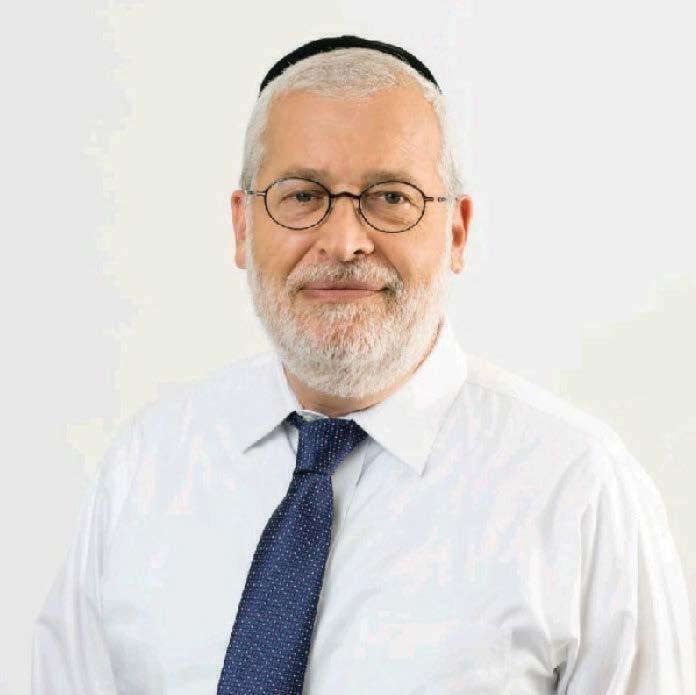
Benny explains that in order not to get tired of a niggun it has to go somewhere and return. There has to be something going on. or you could get tired of that niggun. A song is meant to do something for you and old Chabad niggunim takes you on a journey.

Another example of difficulties that Israeli chareidim face is the draft. Mishpacha discussed population statistics -- one out of four children is Charedi– and how the army and Charedi society can possibly reach a solution.
The paper is faced daily with Hashkafa decisions that have far-reaching effects on our society. The issue of printing pictures of women in the magazine has been debated back and forth in many forums. When Hilary Clinton was running for President, Mishpacha shocked many readers by publishing a blurry photo of Donald Trump and Hilary on the cover. “We just wanted to see how people would react,” Eli confides.
Benny explains that people have to realize life is a struggle. He explains that posts on social media generally aim to share positivity and uplift people. While trying to influence people positively this does not mean that people are only experiencing positive things. Joey agrees that on social media people only post exciting events like vacations and fancy concerts and people only see the good things. People do not post their struggles on social media but “everything you do in your life has struggles and good points”.
Which song would you sing to your Rebbe?
The office did receive some complaints, but the Gedolim the magazine consults advised them to include her since there was a real possibility Hilary would indeed become president. However, in Israel, an anti-Mishacha publication blasted Mishpacha , claiming they were breaking the rules of modesty and Torah by publishing a picture of Hilary Clinton.
This became a real issue because it was very hard for Eli to justify in his mind why they could not print modest pictures of women, particularly considering how hard it seems to be to explain to ba’alei teshuvah why women are “ignored.” In order to make Mishpacha, often one of their first exposures to Yiddishkeit, more palatable, Eli is comfortable with his decision.
Benny explains that traditionally Chassidim didn’t talk in front of the Rebbe but on reflection, he would sing Mordechai Ben David’s “Hineni” I am ready, I am here to serve you.
In defense of modern Jewish music, Benny says when people say non-Jewish music is better than Jewish music they are talking about the top 1% of musicians who are right at the top of music production on the planet. However, he says that the comparison between non-Jewish music and Jewish music is not valid. He explains that what makes something a Jewish song can be compared to bishul Yisroel, a yid has to have something to do with it. The person who writes the song poured something in while the person who listens drinks it. There are Chassidic songs clearly from non-Jewish origins, many of them are Russian tunes but the content is Jewish. The test in everything is what is bringing you closer to Hashem.
Joey would sing Thank you Hashem. He likes to see the positive in things and he thinks that the song “Thank You Hashem” did a lot of good. Benny agrees this song brought great energy to Klal Yisroel and if you look you could find good or bad in everything.
He’s on a big mission: to expose our brothers to true Torah values, and he bears the responsibility seriously. He often employs a different way of thinking, a creative model, a stretch and a twist, that can support our lifestyle while at the same time show that we care about the Israeli economy, security, and its welfare system. “Instead of just complaining about why we are not understood,” Eli explained during the interview, “we must ask what we can do in this field. While we have to make sure that our kids are not too exposed to the big world, the (outside) world exists, and we have to face reality and come up with practical solutions. “
Rather than hiding his head in the sand, he is ready to take on the problems in our neighbourhoods and cities, working with the authorities instead of against them. Slowly, he believes, we will be able to build better trust.
Joey feels he never struggled besides for the nisyanos that everybody has. However, what stands out is the way he struggled his way through high
The message they would like to leave is that one should always remember who they are, Mamleches Kohanim Vegoy Kadosh. Stay positive and keep fabrenging.
Eli is proud that Mishpacha does not try to be sensationalist. Rather he makes an effort to keep his editorial policies responsible and sensitive. “If you’re going to do it le’shaim shamayim” Eli ended, “you’ll have disyata d’shmaya to do it right.”
Since its founding, The Associated has been committed to strengthening Israel and the Baltimore Jewish community’s connection to our Jewish homeland.
From its earliest days, The Associated, through its overseas partners, the American Jewish Joint Distribution Committee (JDC) and the Jewish Agency for Israel (JAFI), helped hundreds of thousands of Holocaust survivors who immigrated to the Jewish state. Over the decades, we continued to support aliyah, ensuring that Jews around the world, whether facing persecution or just wanting to start new lives, would find their way to Israel.
Today, we continue our work with Israel — providing life-changing, immersive experiences in Israel for our teens and young adults, as well as opportunities to engage in dialogue in Baltimore about the most complex issues through the Insight Israel Forum.
And through JDC, JAFI and World ORT, as well as our funding of programs in our partner city of Ashkelon, we help Israelis who are struggling — making it easier for them to succeed. We also foster people-to-people connections through the Baltimore-Ashkelon Partnership.
Thanks to The Associated, we are:
Making
The Associated provides a number of ways to make your gap year more affordable. Through the Community Fund for Israel Experiences, Baltimore’s Jewish students can receive stipends
to make learning in Israel for a summer or a gap year more affordable.
“Travel to Israel has a huge impact on Jewish identity. Every year, hundreds of local teens travel to Israel for school trips, summer programs and gap years in Yeshiva or Seminary. These trips are expensive, especially in today’s economy,” says Rabbi Aaron Levitt, executive director of Jewish Educational Services.
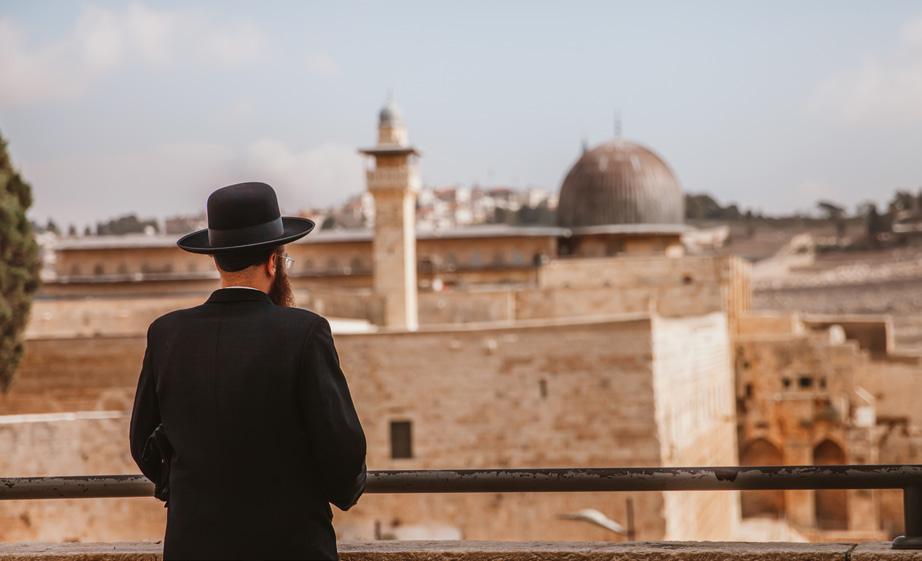
“The Associated’s Community Fund for Israel Experiences (CFIE), administered by Jewish Educational Services (JES), helps subsidize these incredible learning opportunities for the community. Spending time in Israel, learning Torah and walking in the footsteps of our ancestors, helps our teens develop their independence, their spirituality and their love of Am Yisrael and Eretz Yisrael,” he adds.
The Associated also helps subsidize the cost of MASA Israel Journey. MASA offers incredible opportunities to spend a gap year studying at one of the leading seminary programs in Israel.
Helping All Israelis Succeed Working with our overseas partners, we provide opportunities that ensure that all Israelis can succeed. Programs range from supporting young children with post-traumatic stress disorder and anxiety to helping individuals with disabilities thrive in school.
Through our work with JDC, we’ve funded a number of programs that support the Haredi community helping them learn job skills and find employment that leads to self-sufficiency.
For example, Hanoch, a vocational training supplement to Torah study, designed for Haredi men, ages 17-25, offers workshops that help identify professional interests and mentors to assist with job applications, interviews and more. So far, thousands have participated from more than 22 yeshivas.
And the Chen program works in partnership
As we celebrate Israel’s 75th, we hope you will join us for the many events being put on by The Associated and its agencies. Here are a few to choose from:
Celebrate Israel@75 Through Art –Art Contest
Enter now through May 18
Baltimore Celebrates Israel: Showcasing 75 Years of Technology and Innovation
May 2, 5:30 p.m.
Baltimore Museum of Industry
Pearlstone Food and Crafts Authentic Shuk
May 21, 12:00 p.m.
Pearlstone
Grow! Israel: A Multi-Sensory Mobile Art Experience
June 4, 10:30 a.m.
Rosenbloom Owings Mills JCC
For a full list of events go to: associated.org/israel75
with the Ultra-Orthodox girls’ schools to offer educational tracks such as computer science and graphic design. Located in more than 40 seminaries, the Chen program has trained more than 6,000 women to date.
Through JAFI, we are there for the tens of thousands of Jews who make aliyah to Israel each year. From the very first step to ensuring that every Jew is integrated successfully into Israel. That includes navigating new benefits, helping with learning the Hebrew language and providing employment assistance to integrate into the new home.
Go to associated.org/join-our-mailing-list/ to sign up for our newsletter about our Israel work.

Idid it. After more than ten years of using an unfiltered smartphone, I took off my browser. It was really hard for me. Every few minutes, I found myself reaching for my phone to look something up, but without a browser, that was impossible. Though it was a struggle, it helped me be more in control of my smartphone use, which was getting out of hand.
What happened next was a real message from Above that I was doing the right thing. I was at a simcha and received a text from my bank asking if the charge to Walgreens for over four hundred dollars was one I recognized. No, that can’t be me, I said to myself. Then it said that if I did not recognize the charge, I should click the attached link. Because I didn’t have a browser, I couldn’t click the link. I was a little
anxious that the fraudulent charge would be my responsibility because I didn’t respond, but I couldn’t do anything about it.
Later that night, I went on my computer and copied the link into my browser. My bank’s logo came up and I started answering questions about the fraudulent charge. Something felt odd about the questions, and I decided to call my bank to confirm this was real. They told me it wasn’t from them, and I quickly left their fake banking site!
I realized that if I had the chance to click the link on the spot at the simcha, I wouldn’t have concentrated on the details. It was very possible that my lack of browser saved me from getting scammed!

Internet crime includes any illegal activity involving one or more components of the internet, such as websites, chat rooms, and/or email. Internet crime involves the use of the Internet to communicate false or fraudulent representations to consumers. These crimes may include, but are not limited to, advance-fee schemes, non-delivery of goods or services, computer hacking, or employment/business opportunity schemes. In 2018, $2.8
billion dollars was stolen through internet crimes. The number rose exponentially and in 2022, the amount was $10.3 billion. Credit card fraud is the top type of identity theft, and the numbers keep growing. Protect yourself by changing passwords often and by never giving your personal information to anyone unless you called your bank directly.
To share a tech triumph or story of chizuk, please email Techtriumphs@ tagbaltimore.org.
This is a service of TAG Baltimore. TAG Baltimore is an organization that provides technology awareness, education, and support. They can be reached at 410-449-1824 orhelp@ tagbaltimore.org.


Dear Reader,
This letter came in months ago, and I just never ended up publishing it. The letter writer, however, did get my response and was appreciative. I can now share the letter and the follow-up to the original letter with you!
Q:Dear Etti, My 5th grader keeps getting sent out of class for talking. The principal and teacher have labeled her a troublemaker. This is really upsetting because she never had this problem before, she doesn’t even know why she is being sent out as she says other kids are talking and she is the only one being punished, and the afternoon teacher is more laid back and having no issues with her. The teacher is new, my child is bright and bored, and I am not getting anywhere with my phone calls to the school. I actually think my child should be pulled out for enrichment.
Any and all advice would be appreciated.
-Mother of a Bored and Bright Kid
A:Dear Mother of Bored and Bright, I hear your frustration. You feel your child is being unfairly targeted and that she is just bright and bored in class.
Let me paint the picture from the other side of the desk.
The teacher is new, and having never taught before, is trying her best. Your daughter, who is bright and bored, is talking and distracting. The teacher cannot discipline the weaker students because they are just being swept along, but your daughter can and should be able to control herself.
Does that sound harsh? It is.
But at the same time, no matter how unfair the matter is, your daughter is fortunate to be in this situation right now. At a young age, she is bright enough to learn that not every task is stimulating, not every day is interesting. And she is old enough to be able to deal with that reality, with your help and support, which will help her become a stronger and better equipped adult.
Life is full of days that are boring at work and unstimulating at home. Our job is to help her become comfortable with inner quiet and acceptance of less than perfect situations.
We know she is doing well in the afternoon, so it is just the morning hours she is struggling with.
Have a frank conversation with her about the realities of life (not about the ineptness of her new teacher) and ask her what would motivate her to sit quietly and not talk, even if others are talking. Ask her if she can keep a personal reflection chart that she self-marks, that you will honor if the school agrees that her behavior matches the chart she is self-marking. (You won’t have to call the school; you will just see if the complaints continue!)
So much of the morning is davening and Chumash/ Navi; brainstorm with her so she knows what she can do if the teacher is repeating information and she understood the lesson already. Ask her to look for shorashim that keep appearing in all three, challenge herself to check what Rashi says in a pasuk, and remind her that she must keep up with all classwork to rate herself excellent for the day.
Help her learn tolerance and help her understand that the teacher might expect more from her because she is bright and she can do better.


There is so much to be learned from dealing with people with whom we don’t “click.” These are the situations that turn children into problem solvers. Unless the teacher is mean, abusive, or causing a loss of learning that can never be regained, swooping in the speak to the school and demand changes rarely helps, and according to much research, actually hurt. Resilience must be learned, and if Mommy or Daddy are always fixing everything, a child grows up without coping skills. Get tutoring help if you
are worried, but if your daughter is as smart as you say, she will be fine. Role play, script conversations, and help your daughter manage her own life.
The class might not be as boring as your daughter describes. The teacher might not be as inept as the situation seems. Give the situation a chance to discover your daughter has inner resources that will help her learn to deal with life when it does not go the way she wants it to.
Don’t forget to show your daughter how you feel with actions, like sending in a Chanukah gift to the teacher and principal, thanking them for all the hard work they do.
Hatzlacha, -EttiDear Etti,
Just a quick note of thanks. My daughter and I had a long talk, and she has been behaving much better in school. I even got a compliment from the principal about her turn-around. My daughter admits that now that she is committed to listening, the teacher is not as boring as she thought, and when she is, she has the ideas we came up with to think about instead. Obviously, she is more positive overall, and I enjoy the lessened negativity. And I love that I didn’t have to call the school and create a matzav! The gifts were a smart touch. My daughter felt important and happy giving them. We followed up with personal mishloach manos as well.
Thanks again.
-Mother
of Learning to Deal with Boredom BetterMrs. Etti Siegel holds an MS in Teaching and Learning/Educational Leadership and brings sound teaching advice to her audiences culled from her over 35 years of teaching and administrative experience. She is an Adjunct at the College of Mount Saint Vincent/Sara Shenirer. She is a coach and educational consultant for Catapult Learning, is a sought-after mentor and workshop presenter around the country, and a popular presenter for Sayan (a teacher-mentoring program), Hidden Sparks, and the Consortium of Jewish Day Schools. She is a frequent contributor to Hamechanech Magazine and The Journal for Jewish Day School leaders. She will be answering your education-based questions and writing articles weekly for The Jewish Home. Mrs. Siegel can be reached at ettisiegel@gmail.com.
Our job is to help her become comfortable with inner quiet and acceptance of less than perfect situations.
“The enemy were the British,” Micha Netzer says emphatically.
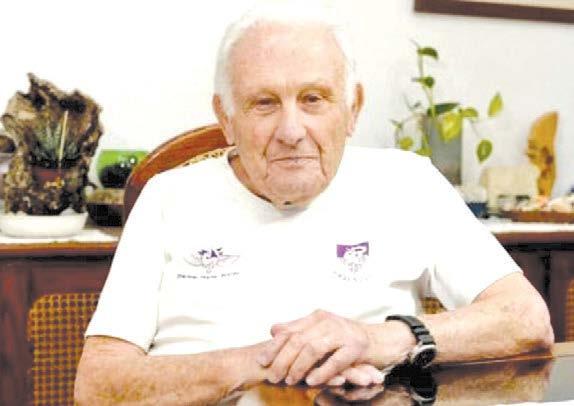
The British? Not the Arabs? Of course, the British. Micha is surprised I don’t remember.
When Micha was growing up, the Jewish-Arab conflict, which has dominated the region for most of the last century, was relatively young – and secondary. Jews of Micha’s generation weren’t interested in defending Israel – they had to create the country from scratch.

Micha is so clearly a product of his generation. He even looks a bit like David Ben-Gurion, the country’s founder and first prime minister, with a broad forehead, fluffy white hair around his ears, and a prominent bald patch. He speaks Hebrew clearly, precisely, and in a sonorous voice. For him, speaking Hebrew isn’t an afterthought. He clearly loves the language and has a deep respect for what it means to be a Jew, speaking his ancestral language in his ancestral homeland. It’s a wonderful, rich, profound Hebrew no one knows how to speak anymore.
When I was growing up, it was beyond obvious that the land of Israel is always open to Jewish Aliya and that we have a pretty powerful army keeping us relatively safe. But that wasn’t the place Micha grew up in. He and his generation created that Israel we know today.
When he was a young man, the Jews in the land of Israel were the underdogs. They had to hide their rusty, inadequate weapons from the British authorities, who would confiscate them whenever they could (while often allowing the Arabs to keep their illegal firearms.) And in response to Arab violence in the 1930s, the British placed strict limits on the number of Jewish immigrants they would allow in. As a result, many thousands of Jews who survived the horrors of the Holocaust had to make their way to Eretz Yisrael illegally. Whenever their immigrant ships were intercepted, the British would tow them to Cyprus and incarcerate the would-be immigrants on the island.
Even when the ships weren’t intercepted, there was always a possibility that the Jewish refugees would be shipped back to Cyprus as soon as they landed in the Holy Land. Micha recalls a time when he and his friends saved a group of fresh immigrants from just that fate. Their ship had successfully eluded the British, but local Jewish leaders were concerned that the immigrants would not have enough time to disembark and disappear before British troops were alerted and arrived on scene. They sent Micha and his friends to help. Indeed, by the time the British paratroopers,
whom Micha and his friends used to describe as kalaniyot (poppies) – a snide nickname derived from the paratroopers’ red berets – the immigrants were still stranded on the beach. However, Micha and his friends had intermingled so thoroughly with the immigrants, exchanging clothing, teaching them basic Hebrew including answers to “what is your name” and “where are you from,” as well as old kibbutznik songs and dances, that the Jews, both those of Palestine and those from Europe, were an indistinguishable mass. The British could not separate the illegals from the legals, and so eventually they decided to let many of them go. For Micha, the memory is an amusing one. He laughs when he recalls that he missed a free trip to Cyprus; his friend, who was mistaken for an immigrant, was hauled off to the island before authorities realized their mistake and returned him to the shores of Palestine.
As a teenager, Micha joined the youth branch of the Haganah – the largest Jewish paramilitary organization in Palestine. He trained with his friends for the day – when, after so many years, Jews would finally be called upon to protect their own state once again. His childhood in Palestine taught him that the British were the ones who stood between Jews and Jewish sovereignty; and so, Micha wanted to participate in ridding the Land of them. The view of the British as the enemy was the reason that in Palestine, unlike many countries colonized by the British, the locals did not ape British mannerisms, dress, or language. In fact, a Jew speaking English was regarded as unpatriotic.
Back then, the culture was very different from what we’re used to today. Jews like Micha identified as Palestinian, since they were born in what was then known as Palestine. Many studied Arabic so they could communicate more easily with their Arab neighbors. Some adopted Arab mannerisms and headgear and drank their morning coffee with their Arab friends. Their Arab counterparts did not identify as Palestinian but rather as Arabs, Moslems, Southern Syrians, or members of a particular tribe or village. These cultures and identities would drastically change over the next fifty years: Micha would learn English for his job as an air force technician. Years of conflict have driven Israeli Jewish and Arab culture firmly apart; and two new identities would emerge – that of the Israeli, and another one re-defined, that of the Palestinian.
Israel officially declared its independence on the fifth of Iyar, May 14, 1948. Micha remembers a story that circulated at the time, that Ben-Gurion had stayed up the entire night before, pleading, arguing, and convincing hesitant delegates to vote in favor of declaring Independence. Ben-Gurion’s obstinate persistence finally paid off when, in the early hours of dawn, one member flipped. Ben-Gurion had the numbers, and so proceeded to read the-now famous Declaration. An eighteen-yearold at the time, Micha (like many of his friends) regarded the Declaration with the healthy disgust many people reserve for politicians. They believed that it was useless until proven otherwise – and since politicians were behind it all, it was safe to assume that it might even be harmful. Because what did the Declaration actually do? It did not magically create a government or governing system, an army or a stable economy. It certainly did not make the Arabs any less hostile. For Micha Netzer, the Declaration was just a bit of fancy prose; the Jews would have had to continue their bloody, desperate struggle for existence regardless. To this day, Micha describes the declaration as “the jabbering of politicians.”
Micha, as he is known to friends and family, was born Michael to parents Rivka and Haim Netzer. They lived in the then-young community of Rehovot, which his maternal grandfather had helped found. When the War of Independence broke out, Micha drafted to the newly-formed Israel Defense Forces, along with the friends who had trained with him in the Haganah Youth. According to Micha, the term “War of Independence” is misleading: independence had already been won – from the British who controlled Palestine. The Declaration announced the Jews’ victory. The war that
was about to begin wasn’t a war to free the land from a foreign occupier: it was a civil war between the two peoples of the newly-independent territory, a war that would culminate in the founding of a Jewish State.
But while the British had officially exited the arena, packing away their troops and armaments, they had also left behind them a grim legacy: two well-trained, well-equipped Arab armies. Prior to independence, Britain had controlled both Egypt and Transjordan (today’s Hashemite Kingdom of Jordan.) As a result, both the Egyptian army and the Jordanian Legion were trained and equipped by the British. The Jordanians still had some experienced British mercenaries working for them at the time.
When Micha arrived at the recruiting office, he saw his former commander in the Haganah’s youth branch seated behind the recruiter’s desk. “What can you do?” the man asked Micha. “What you taught me to do,” Micha replied. He could crawl swiftly over sand dunes. He was familiar with guns: he could assemble and dissemble them in the dark. But that didn’t mean that Micha knew how to use firearms: he had learned neither to aim nor to fire. The Haganah didn’t have enough ammunition to waste on training its youth members. So, along with other raw recruits, Micha was sent to train for six weeks before joining the front as part of the Givati Brigade.
Before Micha can get into the details of all the battles he participated in, I ask him to answer a much more fundamental question: what motivated him and his friends to fight? When Israel’s War of Independence began, it looked as if the odds were stacked pretty heavily against the Jews. Why did Micha and his friends opt to fight rather than try to find a way out?
My question puzzles Micha. He tells me he grew up dreaming of a Jewish State: his parents always spoke of it and his schoolteachers kept mentioning it. From his point of view, it was reality, a dream on the verge of coming true – it was evident Independence was a

necessary and inevitable stage of the Jewish story. It just had to materialize.
I tell Micha a story can’t be enough to win a war. But Micha insists the story of the Jewish nation is what gave him strength, that a story is enough to win a war. That’s how it was.
Micha’s generation fulfilled the dreams and prayers of almost forty generations of Jews. Their actions achieved more for the Jewish people in the Land of Israel than those of any other generation in recent memory. They lived in an age of great change and flux, which meant that the impact of everything they did was magnified to such an extent that it often impacts us to this very day. Their age was one in which a few dozen soldiers could decide the fate of a district, where a few guns at the right
place and in the right time could make or break a nation. The same applies to the mistakes they made. The actors of that age were definitely human and therefore made some poor choices, which history has magnified, along with their many achievements.
I ask Micha to tell me about one of the most infamous episodes of Israel’s pre-state story, known to history as the “Saison” – short for the French “la saison de chasse,” or the hunting season. During the months of the Saison, members of the Haganah hunted down, kidnapped, tortured, and betrayed to the British members of two rival Jewish undergrounds, the Irgun and Lehi. It was, quite literally, open season for hunting those Jews.
The Haganah made the decision to launch the Saison under the most difficult of times – the closing months of World War II. The Haganah’s policy throughout the war had been to support the British in their fight against the Germans, both because the Haganah believed the Germans were by far the worst enemy and because they hoped that the British would agree to form a Palestinian-Jewish military brigade, whose soldiers could then gain useful combat experience under some of the world’s best officers. The Irgun and Lehi took a different approach: Lehi refused to cooperate with the British altogether; and the Irgun joined it in taking up arms against the British in protest of Britain enforcing its stringent migration quotas against Jews – but only in 1944, when it was clear that Germany was going to lose regardless of what a handful of Jewish guerillas chose to do in Palestine. The British refused to create the Haganah’s Jewish brigade as long as Jews were attacking them, so Haganah pressured the Irgun and Lehi to cease their attacks. The Haganah’s efforts were peaceful at first, but they soon escalated.
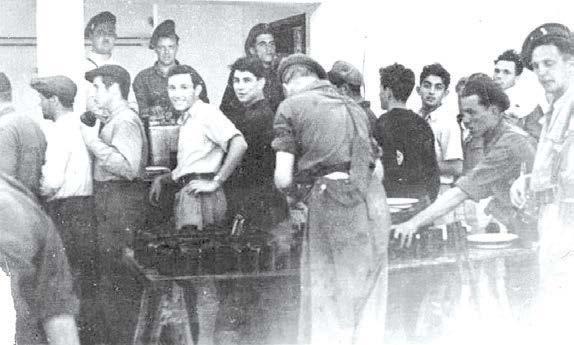
In November 1944, two Lehi gunmen assassinated Lord Moyne, the British Minister-Resident for the Middle East. Moyne wasn’t particularly anti-Jewish: while he was zealous in enforcing the strict quotas that Britain imposed on Jewish migration after the Arab revolt in the

The war that was about to begin wasn’t a war to free the land from a foreign occupier: it was a civil war between the two peoples of the newly-independent territory, a war that would culminate in the founding of a Jewish State.Micha with friends assisting immigrants into the country, 1947 The Exodus docked in Haifa, 1947
1930s, there is some evidence that he did support the creation of a Jewish state. The Lehi assassins hoped to create a splash, and they did – but not in the way they had hoped. The assassination infuriated the British and disgusted the Haganah, who were now terrified of British retribution. And the Haganah was particularly vulnerable to British retribution. The Haganah was a semi-recognized paramilitary – unlike the Irgun and Lehi, which were underground organizations – which meant that the British knew enough about the Haganah that they could smash it easily if they chose.
The result was the three-month Saison. Ironically, Lehi, whose actions triggered the Saison, escaped almost unscathed – probably because one of its leaders agreed to cease its anti-British attacks, and perhaps also because they threatened to fight back against the Haganah’s brutality and betrayals. The main victims were thus the Irgun members. They refused to fight back against their Haganah tormenters, staying true to their principle of never drawing a trigger against their fellow Jews. The Saison was terribly unpopular, even at the time; and public opinion soon forced the Haganah to back off after just thirteen violent weeks of “hunting.”
Naturally, Micha is reluctant to discuss the Saison. He’s clearly uncomfortable with what happened, but he finally agrees to share some of his experiences.
“I won’t mention any names,” he says. “In the many years that followed, one of the people involved became the Commander-in-Chief and another became a general.”
He tells me that, together with a friend, a fellow Haganah member, he often visited teens belonging to the “wrong” youth groups and beat them up. One such misguided youth was the brother of a fellow Haganah comrade. The two friends arrived at his home and began beating him up in front of his mother who screamed at them to “stop, stop, stop, he is the wrong boy, he’s the one in the Haganah – you’re looking for his brother!”
Micha abruptly stops speaking. I ask what happened next.
“We left,” he says, and then mentions, almost as an
aside, that he and his friend found other youths to beat up. He doesn’t say whether they ever returned to that house.
I don’t hide my horror and disgust, and Micha responds to my expression slowly: “That’s how it was in those days. They told us those others were the enemies. We believed them. That’s how it was.” He states that there was deep hatred towards the other organizations.

Palestinian Jews so bitterly. The same is true regarding the racial and cultural divisions between Ashkenazi and Sephardi, or between the native-born Sabras and the new Olim. You are all in it together.
He does not explain who those “they” were, the “they” who told him and his friends what to believe. He does not explain why he and his friends believed them. He wants to talk about the British again.
“It helps when you don’t stop to think,” Micha says with a wry smile, referring to a second motivation to fight.
The newly-formed IDF included members from all three pre-state freedom-fighter organizations, and its soldiers were kept busy fighting the armies of five Arab states, as well as local Arab villagers. The soldiers did not have time to dwell on old rivalries.


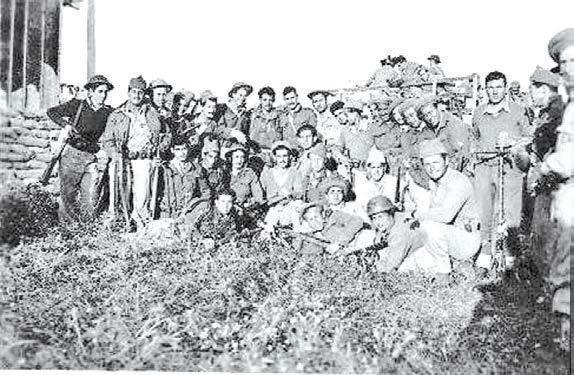
“There was suspicion, initially,” Micha admits, but he says that it quickly dissipated. After the first battle, when you fight shoulder to shoulder with the “other” against the same enemy, each of you relying on the other to cover his back, you realize you’re all in it together. Your political differences no longer matter. You don’t have time or energy for the ideological arguments that divided the
I wonder if that wonderful camaraderie lasted after the war. Micha says it did. I find it interesting, since much of the divisiveness and anger in contemporary Israeli society are rooted in grievances, both real and imaginary, that allegedly occurred during Israel’s early days. It’s not surprising that Micha doesn’t recall them – he’s focused on the big picture: the founding of an independent Jewish state. My generation, which takes that huge accomplishment for granted, has the leisure to reflect on the victims of those early days, and on what could, and should, have been done differently. I think of the fresh Yemeni Olim, who arrived in Israel only to be sprayed with DDT. The immigration officials who sprayed them weren’t evil – they wanted to kill off whatever germs those immigrants might’ve been carrying from their impoverished, not-too-sanitary homeland. In short, those officials were both well-meaning and also ignorant. But being treated like disease-ridden fleabags rankled and contributed to many Yemenis’ fury at the state’s mostly-Ashkenazi ruling class, anger which plays a huge role in Israeli politics to this very day.
Then there’s the equally sad, but not nearly as innocent story of the treatment of Irgun veterans. Their most talented officers almost never secured a senior post in the IDF – those roles were reserved for Haganah veterans and their disciples, many of whom weren’t nearly as talented as the Irgun veterans whom they went on to command. Some Irgun veterans were even forced out of the job market for having the wrong political views; as a result, they were compelled to emigrate from the country they fought to create just so they could survive economically.
I mention some of those stories to Micha. From his descriptions of himself, it seems he was not passionate about the party politics of the day; he simply wanted to fight for his country, and part of being a good soldier involved obeying orders – even when some of those
Micha’s generation fulfilled the dreams and prayers of almost forty generations of Jews.Micha following his first training exercise in the IDF Members of the Givati Brigade During the Battle of Tel Arish
were political. But he doesn’t focus on the latter aspect. Instead, he repeats that the camaraderie between the individual soldiers did indeed persist, despite their diverse politics and circumstances.
Micha also reminds me that, while many of today’s sectarian divisions and labels can be traced to Israel’s early days, those divisions weren’t around when the state was founded. For instance, he tells me that back then many chareidim both studied Torah and served in the military; that labels which describe segments of contemporary Israeli society, such as “Religious,” “Religious-Lite,” “Religious Zionist,” and “Torani-Religious Zionist” did not exist back then.
Micha relates how, growing up in the community of Rehovot, he and his father would attend synagogue every Shabbat. No one in Rehovot worked on Shabbat; the founders of the community decided they would honor “the religion of The People of Israel.” Then, after prayers, Micha, his father, and other Rehovot men and youths would leap onto Haganah jeeps that collected people for military training.
“Today, I drive on Shabbat,” he admits. “I fast on Yom Kippur. You won’t find a speck of chametz in my house during Pesach. I can’t stand it if someone says anything derogatory about religion in my presence. Now you tell me – am I religious or not?”

After describing the culture he grew up in, Micha shares some of his experiences from the War of Independence. He gives me a blow-by-blow account of how some of the battles were fought: where his Givati Brigade positioned itself relative to the enemy, what tactics were used, and how the outcome of each specific battle impacted the fate of the war.

He also tells me about Faigele. Faigele, born Eliezer, was a Holocaust survivor from Europe. Faigele arrived in Rehovot after World War II and was soon serving his new community, first as a fireman and later, when war broke out with the Arabs, as a soldier in Micha’s Givati Brigade. Micha and Faigele crawled through muddy ditches together, supped together by the campfire, and faced the enemy shoulder-to-shoulder. As he speaks, Mi-
cha moves his right hand slightly, motioning to an area parallel to his chest, slightly to his right. It was just about there, during the battle of Tel Arish, that Faigele stood when he was shot and killed. They’d known each other for just two months.
I think of Micha as he must have been at that time – eighteen years old, young, vigorous, fighting for his life, his friend shot dead by his side in a war that killed
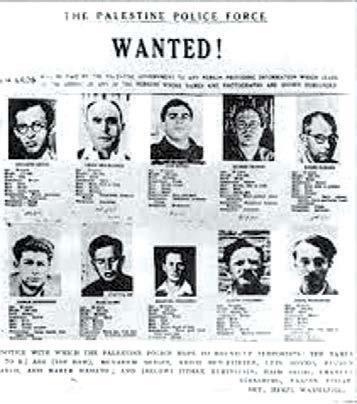
cattle rancher and begged him to supply the troops with fresh milk on a daily basis. The most the officer could offer in return was his own guarantee that the state of Israel would repay the farmer sometime in the future. The farmer was as patriotic as the soldiers, willing to provision them even on the basis of such a dodgy promise. He faithfully provided the unit with milk until his property was destroyed by Egyptian bombs. Micha’s commander struck a similar deal with a nearby baker. Both the farmer and the baker were indeed paid when the Israeli lira was minted.
Later, Micha emails me, telling me he forgot to mention one thing about the atmosphere of those times: “In one of our difficult battles, Ibdis, near Negba, the Minister of Defense visited. He said: ‘I see the sparse unit, but the spirit fills the holes in the ranks. This spirit is Givati.’”
a staggering one-percent of the entire Jewish population in Palestine. I ask him what it felt like.
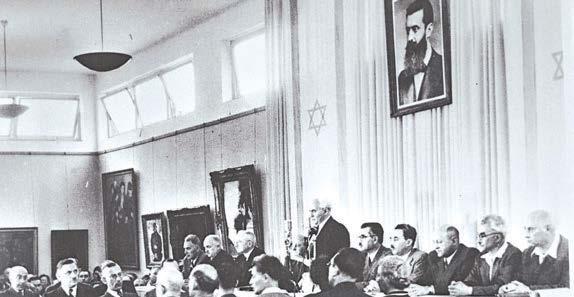
“It was hard,” Micha says.
He won’t say more.
In fact, the battle of Tel Arish was one of the Givati Brigade’s nastiest battles. The brigade was devastated, both physically and emotionally, but as their commander pointed out, they had to learn how to lose a battle every so often if they were to win the war.
But the actual fighting wasn’t the only obstacle that Micha and his unit had to overcome in 1948. Running a war is expensive, and the army was out of money. The Palestine pound, once backed by the most powerful empire the world has seen in our era, was now essentially worthless. The army could still offer to pay for supplies in Palestine pounds, but no merchant in his right mind would agree to exchange his good produce for bad money. In desperation, Micha’s commander visited a local
Only one year after the Declaration was made, when the State celebrated its first birthday, did the new reality finally seep in: “That’s when I understood. We had a State!” Even after all these years, I hear excitement-bordering-on-awe in his voice.
After completing his army service, Micha worked as an air force technician. He continued volunteering in reserves until age sixty-five. Upon retirement, he volunteered for twenty years locating missing persons. Today, he’s ninety-three years old, is married to Ofra, and has three children, ten grandchildren, and three great-grandchildren.
While Micha is aware of the widespread feeling among many non-religious Israelis today that there is no real justification for the State and for Jews to be in Israel, he remarks that he believes people are merely confused. Even in the face of Israeli’s polarized society, Micha remains optimistic. He loves to share stories of his experiences in Givati Brigade during the war – well, not the War of Independence, but the war of founding of the state, komemiyut, as he would say.
It was just about there, during the battle of Tel Arish, that Faigele stood when he was shot and killed. They’d known each other for just two months.A Wanted poster of Irgun and Lechi members. Menachem Begin is on the top left Ben-Gurion reading the Declaration, May 1948 David Ben-Gurion in Haifa port as the British hand over control, June 1948
Without question, one of the greatest inventions in the history of humanity is beer. Oh, I grant you that the wheel was also a fine invention, but the wheel does not go nearly as well with pizza.– Dave Barry
You better cut the pizza in four pieces, because I’m not hungry enough to eat six. -
Yogi BerraUnless you are a pizza, the answer is yes. I can live without you.- Bill Murray
I’d rather have leftover pizza than leftover feelings. – Sarah Burgess
Every pizza is a personal pizza if you try hard and believe in yourself. – Bill Murray
Anyone who says that money cannot buy happiness has clearly never spent their money on pizza. – Andrew W.K.
I love pizza, meaning: even when I’m in the middle of eating pizza, I wish I were eating pizza.– Jandy Nelson
Any pizza can be personal if you cry while eating it. – Aparna Nancherla








What does a pizza wear to smell good?

Answer: Calzogne
A turkey sandwich walks into a bar and the bartender yells out, “Hey! We don’t serve turkey sandwiches here.”
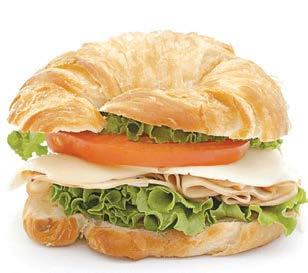

The turkey sandwich replies, “That’s OK. I just wanted a drink.”
***
A guy wakes up in a hospital room alone. His bedside phone rings and the doctor on the other end tells him: “I have really bad news. We ordered several tests and got the results back this morning. I’m afraid you have avian flu, Ebola, and numerous other contagious diseases.”
Stunned, the man asks “Well, what’s next!? What are you going to do?”

The doc replies, “Well, for starters, we’re putting you on a strict diet of only pizza.”
The patient asks, “Will that really help me, Doctor?”
“No”, the doctor responds. “But it’s all we can fit under the door.”
1. Wild Woody’s Chill and Grill, in Roseville, Michigan, achieved the Guinness World Record in 2005 for making the largest sandwich ever. How much did their sandwich weigh?
a. 147 pounds
b. 480 pounds
c. 2,040 pounds
d. 5,440 pounds
2. Why was pre-sliced bread banned in the U.S. in January 1943?
a. There was a salmonella outbreak.
b. The government wanted people to eat less carbohydrates because a study came out that it’s better to eat protein.
c. The government wanted to preserve wax paper and the steel used in slicing machines for the World War II effort.
d. The bread slicing union was on strike because they wanted higher wages, so the ban was meant to take away the sting of the strike.
3. Where does the term “baker’s dozen” come from?
a. In medieval England, bread was sold by weight and bakers who were caught cheating their customers were flogged. Therefore, bakers would throw
in an extra piece of bread so that they don’t take a whipping.
b. Bakers are often considered to be bad at math, hence when a baker counts a dozen, there are oftentimes 13.
c. When Napoleon took over France, he declared that as a sign of his victory, every baker had to give an extra loaf of bread to their customers for the first year of his rule.
d. A term for a good baker is someone who has six fingers on each hand, hence baker’s dozen.
4. Who invented the sandwich?
a. Thomas Edison invented it when his mother wanted him to eat a chicken cutlet and he was busy chasing lightning outside. He grabbed the chicken cutlet with two pieces of bread and ran outside.
b. Benjamin Franklin used to keep a piece of bread in each of his front vest pockets and would eat them along with whatever was being served to him.
c. English statesman, John
Montagu (1718-1792), who was known as the 4th Earl of Sandwich, named after a town in England, started the fashion of eating beef between two pieces of bread.

d. I don’t know who invented it, but I certainly perfected it!
5. How much bread does the average American consume each year (I said “average,” not you!)?

a. 2 pounds
b. 17 pounds
c. 53 pounds
d. 240 pounds
6. What is the end piece of bread called?

a. The end piece
b. The heel
c. Crusty piece
d. Reject piece
Answers:
Wisdom Key:
5-6 correct: You are hereby given the distinguished title of Earl of Sandwich the 5th.
2-4 correct: You are a bit crusty, I mean, rusty.
0-1 correct: You are suffering from carbohydrates brain fog.
In all likelihood, the young people shown on your video probably have never felt the firm hand of a father or the loving hand of a mother. Put another way, if you’re a parent, you stop loving your kid. Your kid’s not going to stop loving you. Your kid’s going to stop loving himself. But I don’t know how government can make parents support their children.
– Sen. John Kennedy (R-LA) on Fox News talking about a recent trend of mobs of teenagers ransacking stores in liberal cities
Most civilized societies are based on free will and responsibility. It doesn’t matter where you are in life. It doesn’t matter what someone’s done to you or may have done to you. You are responsible for your actions.
- Ibid.
This afternoon, the FBI arrested a 21-year-old Massachusetts Air National Guardsman in connection with the leaking of classified documents that were posted online. The leaker is described as a lonely young man who is part of a chatroom group that shares a love of guns and military gear. You know how sometimes — you know you find yourself going, “It’s always who you least suspect, isn’t it?” This isn’t one of those times.
— James CordenHe posted some of the documents in a chatroom for gamers, and I don’t even know how this works. Does someone like write, “Hey guys, how do I win in Fortnite?” and you respond like, “I don’t know, but here’s some satellite images of Ukraine.”
— Ibid.
When you have these woke, race-baiting mayors and district attorneys who say, well, nobody’s responsible, it’s all society’s fault, all that is going to do is lead to a decay of America. And, you know…elect the clown expect the circus.

– Ibid.
There’s nothing – and I mean this from the bottom of my heart – there’s nothing our nations can’t achieve if we do it together. I really mean it. So, thank you all. G-d bless you all. And let’s go — let’s go la – lick the world. Let’s get it done. Thank you.
- Pres. Biden, ending his speech at a banquet in Ireland



Biden is a proud Irish American. He’s planning to visit relatives over there from the Blewitt family — that’s his family’s name — and I really hope the visit goes well, because if Biden blows it with the Blewitts, Fox News is going to have a field day tomorrow.

—
Jimmy KimmelIt’s worrying that taxpayer dollars are being used for a public official to stand at a podium to boast about killing these small, sensitive animals.
- A representative for PETA responding to New York City announcing the appointment of a rat czar, charged with fighting the City’s rat infestation
Maybe create a state park, maybe try to do more amusement parks. Someone even said like, maybe you need another state prison. Who knows? I mean, I just think that the possibilities are endless.
- Florida Gov. Ron DeSantis, who has been feuding with Disney World over its woke ideology, talking about ideas for development in the vicinity of the world famous amusement park
You’re a Jewish New Yorker; I called your office numerous times. I called Mr. Schumer’s office— another Jewish New Yorker— numerous times. No one called us back. Neither one of you came out with a statement on my son’s incident.
We try to get people tools in order to help them put the phone down.Because my philosophy is, if you’re looking at the phone more than you’re looking in somebody’s eyes, you’re doing the wrong thing.
- Apple CEO Tim Cook in a recent interview
So many legal scholars & pundits have viewed my lawsuit against lying, convicted felon, Michael Cohen, a disbarred lawyer, as being meritorious – a very good one. Some have stated, “It’s about time!’” Slovenly, Lethargic Coward, Bill Barr, who didn’t have the “guts” to fight election fraud, & more, because he was afraid he was going to be impeached by the Radical Left Lunatics – The Democrats – disagrees. Barr is a Globalist RINO spokesman for Fox & the WSJ. He is a Stone Cold LOSER.

- Barry Borgen, whose son was viciously attacked in an antisemitic hate crime in 2021, confronting Rep. Jerry Nadler at a House Judiciary Committee hearing that took place in New York City this week
Here in New York, we can’t get guns. The criminals walk around shooting people, can get guns non-stop; it’s unbelievable. A gun charge comes to Mr. Bragg, misdemeanor, no problem, walk the streets. I will not set foot in Manhattan. - Ibid.
- Trump, bashing his former attorney general William Barr, in a social media post
Individuals more easily disgusted by body odors are also more prone to having negative attitudes towards refugees.
- From a recent study by Karolinska Institute in Stockholm, finding that people who don’t like the smell of body odor may be xenophobic
Years ago, we were greeted with birthday balloons as we entered the dining room for the Seder. My husband challenged us to figure out whose birthday we were celebrating. The children were confused and assumed it must be one of the adults. Knowing my husband, I quickly realized there was more to his “prank,” and I correctly guessed it was to celebrate the birth of our nation.
We just celebrated Pesach. It was a time of miracles and the beginning of our peoplehood. It’s difficult to explain to outsiders what being “Jewish” means. How do you explain that someone can be halachically Jewish yet not practicing, while practicing but not halachically accepted? It’s rather confusing because being Jewish isn’t just a religion, it’s a nation, too.
There is tremendous strength in being part of this nation. We are uniquely united, and few outsiders can appreciate the way we support each other. Like family, we may have our differences and squabbles, but ultimately, we stand together and help in a time of need.
Many of us recall Superstorm Sandy that disrupted the lives of many of our community ten years ago. Living near the ocean, in Zone A, we were no exception. It was reported that our block had enough water in our street to reach six feet high. Even after the ocean receded, the water in our basements served as silent testimony. As a friend joked, it was only fair that after all the times we’ve visited the ocean, the ocean decided to visit us.
There was a panic to leave with many unsure what to do. Being 36 weeks pregnant, we evacuated early but there were buses available to transport families on Shabbos – the final deadline to leave.
It was depressing walking down the streets after the storm, seeing the desolation as families left. Curbs were filled with the contents of homes that had been flooded and damaged. Once valued possessions
were now discarded. The sanitation department brought special vehicles that scooped up the garbage as it was too much for the workers to do by hand.
In the face of much darkness came flickers of light. As homes were rendered useless, others opened their own. When we couldn’t cook, others provided our meals. It was an amazing showing of support, and I wouldn’t even attempt to thank everyone that was involved since I would certainly miss many of them.
Chabad of The Five Towns and Yeshiva Shor Yo’shuv were among those that provided free meals to all who needed, as well as clothing and other necessities. Doctors volunteered their services, social workers were on-site, and even professional clowns came to entertain the children. Achiezer provided up-to-date information and assistance. The community opened its doors – and hearts – wide.
Our home was ultimately unlivable without power and heat. Initially, we had tried staying home, using candles for light at night, but it was unsustainable. It was too cold at night for the children, and during the day it was upsetting for the children to be bundled up and shivering.
Many opened their homes, and we, too, looked for a place to stay. While it took the city weeks to realize many were without living quarters, it took us minutes to find housing among our brethren.
While Rabbi Bruce and Rachel Ginsburg have known our family for years, it was still a tremendous surprise when they opened their home to us for an indefinite period of time. Their quiet abode was soon taken over by children that were out-ofsorts from being displaced and an exhausted mother who was due to give birth any day (my husband joined, too, but he was less frightening). They smiled at us no matter what we (inadvertently) threw at them.
Many were standing before their kehillot to raise money, clothing and bring
awareness to the needs of those who lost so much. It was definitely chizuk to see how the Jewish community cared. As meaningful as those gestures were, it occurred to me how much harder it is to personally take the step of inviting one of those families into your home. I could only imagine what a lesson it was to the Ginsburgs’ congregants to see how they didn’t just talk about the needs of others but personally provided them.
We are ten years after the storm, and I still haven’t found the right words to say “thank you for not leaving us homeless.”
Wanting to give our hosts a break, we went away for Shabbos. Total strangers were willing to host us and the many other families in need, people they haven’t seen since Har Sinai. We spent a wonderful Shabbos in Brooklyn with a family that opened their home to us. They had a house full of boys, and ours were thrilled to join the fun. After the mess a rambunctious group of boys can make, maybe it was better I couldn’t see the floor below my abdomen.
The next Shabbos I was even closer to my due date, and we needed to stay local. Again, the community found a Shabbos shidduch for us. I was given the name “Levy” in Woodmere. Levy is a common name, and it didn’t mean anything to me, but it certainly was well known by others. “Oh, you’re so lucky, you’re going to have an amazing time.” “They’re such a special family. You’re going to have a wonderful Shabbos.”
Being a shy person, I was nervous walking into the home of total strangers, and I didn’t know what to expect. Mrs. Chava Willig Levy, a”h, greeted us warmly and did all she could to make us feel comfortable. We had a special Shabbos with her, her
husband Michael, and their family that we will always remember. We learned so much from them and we came away with a new perspective that we so desperately needed during a challenging time.
Like the rest of the community, I was saddened to hear of her passing over Pesach. My family will always treasure that we had the chance to meet her – even if only once – and we are grateful to Hashem for giving us this opportunity.
Being a part of the Jewish Nation is to have a share in greatness. It’s to know that you’re never truly alone and your community will be there for you. We are ordinary people that together do extraordinary accomplishments.
Our nation is blessed with so many incredible individuals. We recently lost someone who is irreplaceable, but we still have the opportunity to introduce our children to the amazing people in our community that will inspire them.
Our children should know they are a part of something greater, and they have their extended family to rely on. Our children should recognize they are an integral part of our greater whole. Our children should remember that they, too, can do extraordinary things that will make a difference in the lives of others.

We’ve already started counting down until we will once again receive the Torah together, uniting us in our purpose. May our kehillos continue to be united in truth and ahavas Yisroel.
Sara Rayvych, MSEd, has her master’s in general and special education. She has been homeschooling for over 10 years in Far Rockaway. She can be contacted at Rayvych Homeschool@gmail.com.

Thank you for your insightful column. I was wondering if you could answer my question. I’m kind of hoping my parents will read it – ha, ha.
I noticed a young woman at our Pesach program. She seemed like my type. I am 26 years old and have been dating for 5 years and by now I know what works. Her family seemed close, she was put together, I found her to be attractive, she was reading a lot in the lobby (I am also an avid reader). A couple of times I noticed her looking at me. I am trying to have my mother get the shidduch redt, but she won’t do it. She said she met the parents over yom tov and they are “not our type.” I know what she’s saying. My family is very in-rown and are a typical frum, yeshiva family, balabatish. This family was from out-of-town, her father was wearing a knitted yarmulka and no hat, the sibs were all over the place in terms of hashkafa. These things mean nothing to me, but to my family, it means everything.
Basically, I feel like I’m stuck between a rock and a hard place and would love to hear the insights of the panelists.
Thank you!
-Eli GDisclaimer: This column is not intended to diagnose or otherwise conclude resolutions to any questions. Our intention is not to offer any definitive conclusions to any particular question, rather offer areas of exploration for the author and reader. Due to the nature of the column receiving only a short snapshot of an issue, without the benefit of an actual discussion, the panel’s role is to offer a range of possibilities. We hope to open up meaningful dialogue and individual exploration.

Perhaps now is the time to start becoming more active in your own shidduch quest. You know what works and seem ready to branch out. You would like to go out with the girl you noticed at the Pesach program and are being deliberate about it as well as taking the initiative. You are 26 years old, and you are taking advantage of opportunities to expand your circle of possible candidates.
Consider talking to both parents about this general topic of taking initiative and that it’s time. Think through it beforehand and have a few conversations about ways to meet people and new venues. Then proceed to get someone to fix the two of you up. This way, you are open and respectful as well as more independent. You can consider telling your parents you may
ask them to check out some candidates going forward.
Michelle Mond
Dear Eli, One of the hardest things about being an adult child is receiving judgment from parents; regardless of your relationship with them, or whether they’re right or wrong. Anxiety creeps in when we decide to do something against the grain. At the same time, you are your own amazing, unique person. This is your life to live and your decisions to make.
If there were true deep issues which were turning your parents off, I would have a different answer to your question. However, this is not the case. You must take charge of your own shidduchim while being kind to your parents. Sit down with
The Navidaters
Dating and Relationship Coaches and Therapists
Dear Eli,
Thank you for writing into the panel. You are truly caught between a rock and a hard place. You met a woman who you are interested in getting to know and felt you may have a potential connection with and due to circumstances beyond your and her control it seems as though this match may not happen. These situations are enormously frustrating for those affected. And painful to learn about for those not directly affected. My heart goes out to you.
You wrote that you hope your parents read this column. I am writing this column keeping in mind that your parents may indeed read it and other parents who feel similarly to yours may read it as well.
There is no exact science to matters of the heart, and I am sure there will be many who will disagree with what is my opinion. Outside the realm of shidduchim in the world of human development, individuation from family of origin and becoming a full-fledged adult, parents often struggle with “allowing” their adult children to become who they are and making their own grown-up choices for their own grown-up lives. Those parents who give their children the respect of trusting them and believing in them and their choices more often than not enjoy a mutually satisfying closeness with their adult children. Parents who be-
them levelheadedly and inform them of your decision. Notice I used the word “inform” because this is not a discussion in which they can change your mind. You are 26 years old and a capable man with his own preferences, wants, and needs.
Many families have machatanim who are different from them, so from that standpoint you should not be worried. Your parents will eventually come around, but in the meantime, make sure you have a mentor to discuss this shidduch with.
Dr. Jeffrey Galler
Has our world gone crazy? Have some strange, alien entities hijacked our religion?
Consider the following: We have two frum families attending a kosher Pesach program. We have a young man who has dated, without success, for five years. We have a young man and a young woman who might already be attracted to each other and have common interests.
But, oh, horrors! He’s from a black hat family, and she’s from a knitted yarmulka family!
So, Eli, what should you do?
lieve they have the right to tell their grown adult children what to do (whether because they are still writing checks or not) often experience tumultuous relationships with adult children. Everyone needs space to discover and explore who they are, hopefully with the encouragement and gentle, appropriate guidance from parents. And adult children often struggle with making choices that may not please their parents.
I would encourage your parents to have an open mind and begin to look into this young woman. People should be considered based on their own merit. It should also be noted that you are a 26-year-old grown man who, in the opinion of many people, should have some sort of say in your dating life. You are a grown-up.
“Otherness” can make people uncomfortable, especially in tight-knit commu-
You seem to be fixated on needing your mother to set up this date. If so, then you may wish to speak with someone whom your mom respects. Ask a local rabbi to intervene with your mother on your behalf, perhaps?
But, Eli, you are a 26-year-old adult. There’s nothing to stop you from proceeding on your own behalf. For example, you might consider asking one of the Pesach program organizers to make inquiries for you with the girl’s family.
In any event, I wonder: Would the world, as we know it, have come to an end, if Eli could have walked over to the girl in the hotel lobby, and said, “Hi. My name’s Eli. What are you reading?”
Perhaps it’s time for our tribe to realize that some of our contemporary dating rituals are outdated and absurd.
(I’ve reached that age where my brain goes from, “You probably shouldn’t write that,” to, “Why not? Let’s see what happens.”)
nities because of the real fear one will be rejected by friends, family and community. I’m not going to give my opinions of exclusivity and judgment within certain frum communities. Suffice it to say it is real, and it impacts those in it and those Jews outside of it.
Your parents may never change their views. (I hope they do, but we need to be realistic that it may never happen.) The question is, what will you do? And when does what they want for you take a back seat to what you want for yourself? Where exactly is the line drawn between respecting our parents and going after what we want?
Just some food for thought…
Sincerely, Jennifer
Jennifer Mann, LCSW is a licensed psychotherapist and certified trauma healing life coach, as well as a dating and relationship coach working with individuals, couples, and families in private practice at 123 Maple Avenue in Cedarhurst, NY. To set up a consultation or to ask questions, please call 718-908-0512. Visit www.thenavidaters.com for more information. If you would like to submit a dating or relationship question to the panel anonymously, please email JenniferMannLCSW@gmail.com. You can follow The Navidaters on FB and Instagram for dating and relationship advice.
Everyone needs space to discover and explore who they are.


O u r t e a m i s p r o f i c i e n t i n a l l a r c h i t e c t u r a l s t y l e s , f r o m f r e n c h c o u n t r y t o u l t r a - m o d e r n a n d e v e r y t h i n g i n b e t w e e n .







The collapse of Silicon Valley Bank (SVB) on March 10, 2023 was a major shock to the financial world. SVB was the largest bank failure in the United States since the 2008 financial crisis, and its failure had far-reaching consequences for the tech industry and beyond. SVB suffered what is known as a “run on the bank” or “bank run.” A run on the bank is a situation in which a large number of depositors withdraw their money from a bank, usually because they fear that the bank will fail. This can cause the bank to run out of cash and collapse.
Bank runs are often caused by rumors or news that the bank is in financial trouble. If enough depositors believe this, they may withdraw their money, even if the bank is actually solvent. This can create a self-fulfilling prophecy, as the bank’s financial situation will deteriorate if it loses a large amount of cash.





Bank runs can have a devastating impact on the financial system. They can lead to the collapse of banks, which can cause widespread financial losses. They can also lead to a loss of confidence in the banking system, which can make it difficult for businesses and individuals to get loans and for an economy to function.

I want to explore the causes of SVB’s collapse and the lessons that can be learned.
It is important to appreciate the indirect role that government policy played in this story. Certainly the gov-
ernment was not trying to cause bank failures when implementing economic policies, but it is often the unknown and unintended consequences that have outsized impacts for an economy and in life generally.
In response to the COVID-19 pandemic, the government implemented swift and powerful policy measures in an attempt to save a stalled economy. More recently, inflationary pressures have caused the Federal Reserve to pursue a historically aggressive tightening policy cycle. Price stability (i.e. managing inflation) is part of the Fed’s dual mandate and controlling interest rates is a key tool that the Fed has to achieve their mandate. Tighter monetary conditions should lower inflation, however, the Federal Reserve’s relatively blunt toolkit often creates unintended consequences within the financial system and broader economy.
When a bank accepts deposits from customers it has 3 choices: 1) leave the money to gather dust 2) purchase investment assets 3) make loans to other borrowers – thus creating a new asset on its books. SVB loaded up on US treasury bond holdings in recent years as cash from depositors increased. Typically a portfolio of treasury bonds are considered to be safe investments. However, the sharp increase in interest rates caused the value of previously issued treasury bonds to fall sharply. This makes sense, afterall, why would I want to hold a treasury bond paying 1.75% if I could buy one today that pays nearly 4%? As withdrawals
increased, SVB was forced to sell its treasury bonds at a significant loss. If depositors never would have demanded their cash back, then SVB wouldn’t have had to realize the losses and we might still have a Silicon Valley Bank!

Social media also contributed to the collapse of SVB in a number of ways. First, a tweet from a prominent entrepreneur, Kim Dotcom, that was viewed by 2.4 million people and retweeted nearly 3,500 times, warned customers to pull their money out of SVB, causing a run on the bank. Bank runs have been a part of America’s financial history for a long time. While the imagery may change from old photos of crowds wrapped around a local bank to people furiously tapping on their smartphones, the fear and panic that encapsulates humans is the same.
There were a number of other factors that contributed to SVB’s collapse that I won’t get into in this article.

The collapse of SVB had a significant impact on the tech industry. The bank was a major lender to many tech companies, and its failure left many of these companies in financial distress. In addition, the collapse of SVB raised fears about the stability of the financial system, which could lead to a slowdown in lending. Many people in the tech industry had seen SVB as a safe and reliable bank, and its collapse shattered this confidence.
Lessons
The collapse of SVB reminds us
that the financial system is deeply interconnected. When one bank fails, it can have a ripple effect on other banks and institutions. The decision to ensure deposits beyond the standard FDIC limit was a welcome relief to despositers, and sparked concerns over moral hazard with some politicians and policy makers. Again, it is often the unknown and unintended consequences that have the biggest impact simply because they are unknown and unintended. This story reminds me about the importance of accepting that we have no idea what tomorrow will bring and so flexibility and adaptability are crucial in personal finance. We should all make sure that our personal balance sheet can meet life’s own “bank runs” that can hit us when we least expect it. A good first step? Maintain a strong personal cash position in an FDIC insured, interest bearing account, so that you won’t be forced to sell assets before their intended sale date.
The decision to start saving and investing is yours, but the “how” can be hard. We suggest speaking with a “fee only” financial planner operating as a fiduciary - having a CPA or tax background is a huge plus. Email commoncents@northbrookfinancial. com to schedule a free financial planning consultation with our team.
Elliot Pepper, CPA, CFP®, MST is Co-Founder of Northbrook Financial, a Financial Planning, Tax, and Investment Management Firm. He has developed and continues to teach a popular Financial Literacy course for high school students.
It takes many types of units to form an army. With the influx of soldiers during World War II, the United States military was able to create units that were disbanded shortly after the war. The Coast Artillery Corps had been around since 1901 and were in charge of the coastal and harbor defenses as well anti-aircraft defense of the United States. Their ranks were bolstered during World War I, and several regiments were sent to fight in Europe. Much of the corps was disbanded after the war, but its numbers went up again during World War II. One of their members was a Jewish officer from Chicago who went above and beyond while deployed to fight the Nazis in France.
Coast Artillery units were present at Pearl Harbor but were mainly in position to stop enemy ships from entering the harbor. To that end, Japanese midget subs were stopped from creating too much havoc on December 7, 1941, and the damage that did occur came from the sky. Three-hundred-fifty Japanese carrier-based aircraft and anti-aircraft units, including those from the Coast Artillery, were largely ineffective against the air attack. There were large turret and mortar weapons on Corregidor and other American installations in the Philippines but these Coast Artillery pieces were undermanned and quickly knocked out during
the Japanese invasion.

Despite the setbacks early in the war, the Coast Artillery grew in numbers as well their capabilities. Their anti-aircraft and weapons units received upgraded weapons, and better candidates – younger and more physically fit – were recruited to bolster their ranks. Additionally, battalions were created for separate units including for guns, searchlights, automatic weapons, and barrage balloons. The 41 st Field Artillery was a railway regiment and was known as the “Rail Gunners.” Coast Artillery paved the way for more effective anti-aircraft units in the military and was soon able to send these soldiers to hotspots all over the world.
The 463 rd Coast Artillery Battalion (Automatic Weapons) was formed in September 1942 and later designated as the 463rd Anti-Aircraft (Automatic Weapons) Battalion. They landed in France a week after D-Day in June 1944 and fought in Normandy, Northern France, Rhineland, Ardennes-Alsace and Central Europe Campaigns.

Lieutenant Albert A. Alop was a Jewish soldier from Chicago and served with Battery D from the 463 rd Anti-Aircraft (AW) Battalion. While at Camp Haan in Riverside, California, Alop came to the rescue of six airmen after their B-24 Liberator bomber crashed after takeoff.
Alop received the Soldier’s Medal for heroism in a life threatening situation in a non-combat environment.
Following the landings on D-Day on the beaches at Normandy, France, it took several weeks for the Allies to complete Operation Overlord and break the German defenses. The Third Army under General George Patton crossed the Seine River at Mantes-Gassicourt on August 18. This was the first bridgehead over the river, and subsequent offensives allowed the Allies to liberate Paris. During the crossing, forty-three German planes were shot down by American anti-aircraft batteries.
On August 23, Lieutenant Alop was in the vicinity of Mantes-Gassicourt and was headed toward a forward gun position. On the way, he established contact with an infantry platoon that was fighting back a determined Nazi counteroffensive. Despite the risks, Alop continued to the gun position and discovered it was being attacked by heavy machine gun fire. He noticed that other German forces were digging positions to place anti-aircraft guns.
Quickly summarizing the situation as desperate, Alop ran towards American tanks and told the tank commander to reroute so they would be in a better position to attack the Nazis. It was at this point that he returned to the forward gun
position, armed only with a carbine, and attacked the German anti-tank position. After knocking it out of action, he proceeded to wipe out an enemy machine gun emplacement. The Nazis were thrown into disarray and began running away. American tanks fired at them and with Alop’s directions were effective in neutralizing the entire contingent of enemy soldiers that tried to get away. There were still some Germans that were hiding, and Alop went from foxhole to foxhole shooting at the Nazis who refused to surrender. In total, with the help of the tanks, Alop killed or wounded more than 100 Nazis and 30 more were captured. Additionally, a number of machine guns and anti-tank weapons were captured by Alop.
Lieutenant Alop was awarded the Distinguished Service Cross for his actions against the Germans in France. He was also wounded in action and awarded the Purple Heart. Alop was one many of the heroes who were vital in the victorious campaign to drive the Nazis out of France and within a year had freed the rest of Europe.
Avi Heiligman is a weekly contributor to The Jewish Home. He welcomes your comments and suggestions for future columns and can be reached at aviheiligman@gmail.com.
When you were young, mom said, “It’s all fun and games until somebody loses an eye.” But now the rules are different. Now, it’s all fun and games until somebody winds up in rehab, as many actors’ and actresses’ lives are upended by various addictions and vices. As one famous singer said, “No, no, no,” and now she’s no longer with us.
Rehab is a tax-deductible medical expense if the costs of treatment, along with the rest of your medical expenses, are over 7.5% of your adjusted gross income. You can use Health Savings Account funds or a medical expense reimbursement plan to cover it. But now there’s a new kind of rehab with expensive options that might not pass IRS muster. Last month, Business Insider published a story on high-end crypto rehab centers, where a week’s stay can run 100,000$
You probably didn’t even know crypto trading was an addiction. But some therapists consider it a form of gambling addiction if it meets six tests. Those include salience (it’s the most important thing in the trader’s life); conflict; withdrawal (they experience withdrawal symptoms if they can’t trade); mood modification; tolerance; and relapse.
Crypto trading never stops – it’s available 24/7/365. And addicts can chase the dragon from any place in the world with a cellphone or Wi-Fi signal.
Castle Craig Hospital in Scotland launched the first crypto rehab program in 2018. Since then, similar programs have popped up across the world. (It’s just a matter of time before Dr. Phil joins the bandwagon.) And crypto bros, who flaunt the mansions, Bentleys, and

24-7 nursing staff, four clinical support staff, and eight 5-star Thai hospitality staff members.”
• The Balance operates ten luxury rehab programs in Mallorca, Zurich, and London. The average patient is a male entrepreneur, age 30-45, who pays $192,000 -$320,000 for a fourweek program that includes a personal manager, a chef, and 70 different therapists. (70!)
they’re deductible, but not if they’re lavish or extravagant. If you and your trading partners are celebrating a big score, you’re welcome to take your business discussion to dinner. But the two-buck Chuck drinkers at the IRS will happily disallow your $2,000 bottle of 1989 Mouton Rothschild. When does a villa on Lake Geneva become lavish or extravagant? Does Uncle Sam really need to subsidize a separate suite for your 24-hour therapist? And most important, can you pay for your crypto rehab treatment with crypto?
Healthcare currently swallows over 18% of our economy, and that number grows higher every year. Smart tax planning can make it more affordable. And it’s hard to make anything when you’re tucked away in rehab, even if you’re surrounded by 70 therapists. Just let us know how we can help!
jeroboams of Cristal they buy with their gains, don’t seem interested in back-tonature programs that could keep costs down:
• The Diamond operates a $25,000 month-long program out of 15 rooms overlooking the Andaman Sea in Phuket, Thailand. Patients enjoy “five clinical psychologists, four clinical addiction counselors, one psychiatrist,
• Finally, Paracelsus Recovery offers a four-week program, starting at $100,000/week, out of four properties on Lake Geneva with a “private chef and maid, a private client suite within the residence, and a separate suite for a 24hour live-in therapist.”
Here’s the problem. Whatever it is you’re deducting has to be reasonable. Take business meals and entertainment:
Allan J Rolnick is a CPA who has been in practice for over 30 years in Queens, NY. He welcomes your comments and can be reached at 718-896-8715 or at allanjrcpa@aol.com.
You probably didn’t even know crypto trading was an addiction.





We received many incredible entries! Thank you to all of our readers that submitted poetry. Keep honing your writing skills, and who knows, maybe you’ll be the next winner!

Congratulations to our winner, Rivky Braffman!
�� , The BJH Staff & Pinny the Pigeon
It all started with a flood of not water, but of blood!
Next, in ancient Egypt, the locals awoke to high pitch and abnormal "CROAKS!"
Winning EntryIf you wanted to venture out into the street, the lice would send you running on the heels of your feet, "A lion in the closet!? Sharks in the sink!? how will I ever get to that drink?"
Just try to imagine a life without meat! or falling asleep without hearing the sheep bleat!
Groaning and moaning can be heard throughout town as all of the citizens try to lie down.
Hail full of fire; oh, where can we hide!? forget the umbrella, I'm going inside!
Ok, we all know how it feels, to have bugs like cicadas stuck in the car wheels. After this, all the sunglasses are going away no one could see all night or all day.
The only people smiling now are those graveyard guys, the firstborns are dying; everyone cries. But they sure deserved it! Hashem scolded them well for enslaving us Jews; boy, do we have a story to tell!
Rivky Braffman, 13


























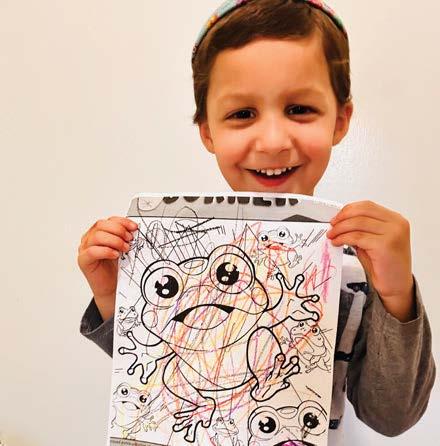
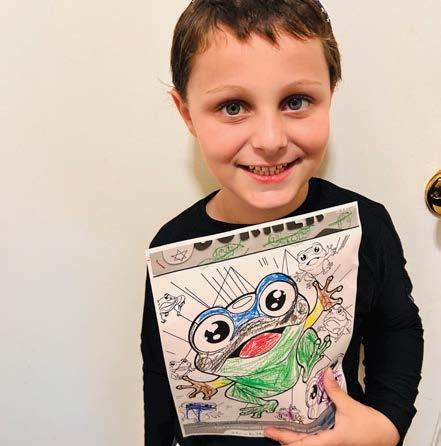
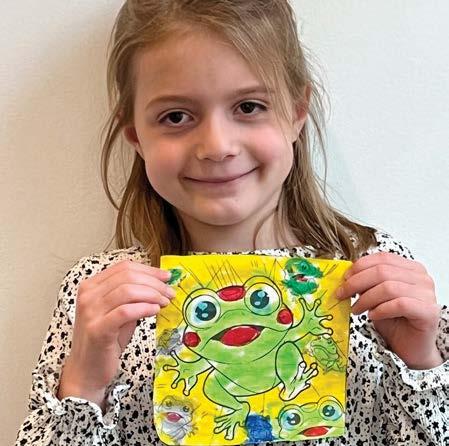







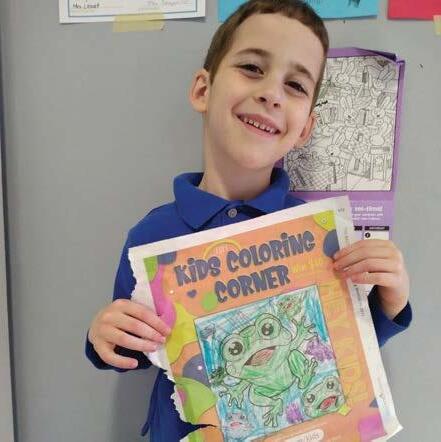

Note: Not all submission have been published. Keep sending in your artwork for another chance to be featured!























Yes, I know. I did, too… Ate way too much, and ate too many matzahs.
It’s just not like years ago, when there was nothing to eat. There’s actually too much to eat!
It’s even hard to be excited about eating chametz again after Pesach ends. What did we miss, after all?!
Except, of course, kids struggle if they like real pasta instead of glop. And M&M’s in their yogurt.
Well, I guess, if you’re a rice relisher
Wealcatch Insurance offers you a wide array of policies and provides side-by-side comparisons, so you get the best coverage, at the most affordable price.
We can tell the difference – and so will you.
410.653.3053 • info@wealcatchmd.com
or a corn on the cob addict you might have missed something.
But, even that one can be preempted if you opt for the right spouse.
So what are we getting excited about now that Passover is in the past?
Forty-nine days of long beards and acapella.
The truth is that Pesach leads to a long period of waiting. Waiting for Rosh Chodesh so we can go to a wedding, or
you talk, it’s with a purpose. When you enjoy, it’s with a purpose. And that makes every minute worthwhile.
Every precious day has value. Whether you’re leaving one holiday or heading into the next, it isn’t just those times alone that have meaning but every moment that leads away from or up to them.
Every precious thing has value –maybe even some overeating – when

Lag B’Omer to go to another wedding, or ultimately Shavuos so we can eat cheesecake without the guilt. (It’s almost a requirement of the holiday!)

And we also get to stay up really, really late with no one telling us to go to sleep. Wait, that was only exciting when we were about 10!
What it is that we enthusiastically get to stay up to do is to appreciate the wisdom of the Torah.
And why is that exciting? Because we’re all running around here trying to figure it all out. There’s lots going on, that’s true, but toward what end?!
And that’s where the Torah comes in. When you eat, it’s with a purpose. When
you are doing it with meaning.
So eat, drink and be merry for a Purpose, and life will be the gift that it is meant to be.
Rivki Rosenwald is a Licensed Marriage & Family Therapist working with both couples and individuals and is a certified relationship counselor. Rivki is a co-founder and creator of an effective Parent Management of Adolescent Years Program. She can be contacted at 917-705-2004 or at rivkirosenwald@gmail.com.
l ike difference in in S urance policie
The first time I had Tuna Nicoise Salad was when I was in Israel for seminary, and I’ve enjoyed it ever since. This is a great seudah shlishit salad because it’s a full meal in a bowl. You can serve this on one big platter or individually plated as an appetizer.

Shallot Dressing
◦ 3 tablespoons white wine vinegar
◦ ¼ teaspoon Dijon mustard
◦ 1 small shallot
◦ 1 tablespoon chopped fresh tarragon or 1 teaspoon dried tarragon
◦ ¾ cup olive oil
◦ Salt, to taste
◦ Pepper, to taste
Salad
◦ 1 head Boston, soft butter, or romaine lettuce, torn into bite-size pieces
◦ 2 (6-ounce) cans tuna packed in oil, drained and broken into chunks
◦ ½ cup Niçoise olives, or your favorite olives
◦ 8 mini potatoes, boiled until fork tender, quartered
◦ 2 hard-boiled eggs, peeled and quartered
◦ 4 plum tomatoes, cut into four wedges
◦ 2 radishes, thinly sliced
1. Prepare the dressing: Place vinegar, mustard, shallot, and tarragon into the bowl of a food processor fitted with the “S” blade. Process until smooth.
2. With the machine still running, slowly add oil in a slow, steady stream to incorporate it into the dressing. Add salt and pepper to taste.
3. Prepare the salad: Line a platter with lettuce, top with tuna, olives, and potatoes. Arrange egg and tomato wedges around platter. Drizzle with shallot dressing; top with sliced radishes.
Cook’s Tip: To really elevate the salad, use fresh seared tuna instead of canned. Season a ½-inch-thick tuna steak on all sides with salt and pepper. Sear in a tablespoon of hot oil for two minutes per side; it will still be pink in the middle. Cut into slices and arrange on platter in place of the canned tuna.
Naomi Nachman, the owner of The Aussie Gourmet, caters weekly and Shabbat/ Yom Tov meals for families and individuals within The Five Towns and neighboring communities, with a specialty in Pesach catering. Naomi is a contributing editor to this paper and also produces and hosts her own weekly radio show on the Nachum Segal Network stream called “A Table for Two with Naomi Nachman.” Naomi gives cooking presentations for organizations and private groups throughout the New York/New Jersey Metropolitan area. In addition, Naomi has been a guest host on the QVC TV network and has been featured in cookbooks, magazines as well as other media covering topics related to cuisine preparation and personal chefs. To obtain additional recipes, join The Aussie Gourmet on Facebook or visit Naomi’s blog. Naomi can be reached through her website, www.theaussiegourmet.com or at (516) 295-9669.


